The Promised Messiahas warning to John Hugh Smyth Pigott
وَلَا نُبْقِیْ لَکَ مِنَ الْمُخْزِیَاتِ ذِکْرًا
“We shall leave no trace of anything the allusion to which might reflect adversely upon your honour.”

By: Raheel Ahmad
Ahmadiyya History Department UK
All rights reserved: No part of this document may be reproduced or used in any manner without the prior written permission of the copyright owner, except for the use of brief quotations in a book review.
Preface
Research is never static. It has always evolved over time and the conclusions, especially those related to historical events, have always been dependent on the sources and material available to the researcher at that time. Thus, there is always room for re-evaluation and revision in light of new information.
The Ahmadiyya Muslim Community is blessed to have a comprehensive historical record since inception, acknowledged by Yohanan Friedmann as the one of the best-documented movements in modern Islam[2]. The founder of the community, Hazrat Mirza Ghulam Ahmad(as) the Promised Messiah and Imam Mahdi established the means of preserving this historical record in his time by inaugurating two Urdu newspapers, Al-Hakam and Al-Badar, and later an English magazine, The Review of Religions, also served a similar purpose. While internal records of the community for research purposes have always been available, additional information from external sources has come to light from time to time and serves as advancement in knowledge in support of the claims of the Promised Messiah(as).
Previous research relating to the prophecy about Pigott presented facts in accordance with the then available material. Therefore, to build on the previous research and strengthen it further, additional research into this subject was conducted by the History Department UK.
Among the prophecies of the Promised Messiahas one published in the year 1902 as a challenge to the claimant of Messiah and Divinity named John Hugh Smyth Pigott, has become a controversy for the opponents of the Promised Messiahas. They claim that the prophecy proved to be false as Pigott did not die within the lifetime of the Promised Messiahas.
This only depicts their lack of understanding about the prophecies especially those relating to a (وعید) warning, that are averted upon following repentance or change in one’s behaviour. These prophecies are conditional or contingent upon persistence in one’s behaviour for which the prophecy was initially made. The case of this prophecy about Pigott becomes evident when one first understands the theological principles of Islam relating to prophecies containing a warning before studying the prophecy in its entirety.
The Holy Quran declares the false claim of communion with God to be among the major sins and a greatest transgression and affirms that such a false mission is bound to fail.[3] The origin of reaching the truth through divine intervention is found in chapter 3 verse 62 of the Holy Quran. When the discussion on the doctrine of the divinity of Jesus between the Holy Prophetsaw and the Christians of Najran continued at some length and the Christian deputation insisted on their false doctrine of Jesus’s divinity, the Holy Prophet saw, in line with the Qur’anic commandment invited them to a prayer contest to invoke the curse of God on the holders of false beliefs.[4] Furthermore, Surah Al-Haqqah Chapter 69 verse 45-48 also establishes that the false claimant of divine revelation is not given a long life and such a one is soon brought to destruction.[5]
After establishing the permissibility of divine intervention from the Holy Quran and Sunnah (practice) of the Prophet, another pertinent verse explains the understanding of prophecies relating to warning. Surah Al-Mu’min chapter 40 verse 29 explains that some of prophecies relating to a warning are fulfilled.[6]
The purpose of God’s wrath manifesting in this life is to make a sign of one who is openly misleading people and publicly proclaiming falsehood. Thus, it requires ongoing public proclamations. Holding a private position, while ceasing public declarations, would make one liable for chastisement in the hereafter, not overtly in this life, since there is no point in making someone a visible sign of chastisement who has ceased open declarations of false claims. therefore, the principle about the prophecies of warning is that they can be delayed or even revoked based on the current condition of a person. The Almighty God deals with a person based on his present condition.[7]
Another point to be borne in mind in relation to the prophecies of warning is that there needs not to be a mention of any condition in order for the punishment to be cancelled, the incident of Prophet Jonahas mentioned in the Bible[8] and also in the Islamic traditions[9] makes this clear, The Prophet Jonahas left the people of Nineveh having prophesized that a divine punishment was destined to overtake them but the punishment was averted due to their repentance.[10] The Promised Messiahas has at length discussed the issue of وعید i.e., prophecies containing a warning in his books that such prophecies are averted on repentance, retraction or turning towards the truth. It all signifies an alteration in one’s behaviour.[11] The Promised Messiahas explains that the purpose of a prophecy containing a warning is so that the individual can change his ways or else if the punishment is unconditional then what need is there to inform the individual about his impending end?[12]
After discussing the above principles for the prophecies of warning it is also essential to note that although these prophecies all fall under وعید (prophecies of warning), yet in their detail such prophecies may differ from one another. Thus, it is paramount that one’s research incorporates all primary historical material related to the prophecy before reaching a sound conclusion.
In the case of the prophecy of the Promised Messiahas about Pigott this research will show that this prophecy was published as a challenge, similar to what had been written to Dowie of America.[13] Therefore, death of both were contingent upon an open acceptance of the challenge or persistence in their public claims.[14] A thorough study of both cases will reveal the opposite response and attitude of the claimants. In the case of Dowie, a reply full of arrogance and derision reaches Qadian while he organised the biggest evangelical trip to Madison Square Garden New York[15], in other words publicly persisting in propagating his claim. Consequently, he was struck with paralysis which later led to his death under the prophecy of the Promised Messiahas.[16] Whereas in the case of Pigott, despite mass publication of the warning in the newspapers, Pigott remained silent and ceased making any further public claims.
The research will present the prophecy and events in a chronological order and complete statements of the Promised Messiahas related to the prophecy to establish that the prophecy was conditional, based upon a challenge. The death of Pigott, therefore, was contingent upon his open acceptance or in the least persistence in his public claim of Messiahship and Divinity. The statements of the Promised Messiahas such as “If Pigott opposes us”, “If he competes”, and “If he is challenged” clearly explain the above-mentioned premise.[17]
Furthermore, the case brought forward by the George Wyndham Kennion, the Bishop of Bath and Wells against Pigott under immorality charges is discussed at length. Mired by the Church’s involvement in immorality in the nineteenth and twentieth century, ignoring the past, and present-day acceptance of such acts we need to remember that there was a punishable offence of blasphemy which in the past had been frequently resorted to by the Church. The research deals with an obvious question: why did the Ecclesiastical Authorities opted to prosecute Pigott under immorality and not Blasphemy despite Blasphemy law being functional?
A conviction under the charge of Blasphemy would sufficiently prove his obstinacy in making public proclamations.[18] The details of the Ecclesiastical Court case against Pigott and the bishop’s verdict are fundamental in establishing that after his initial claim of 1902, Pigott’s life was that of complete secrecy and he avoided making any further public claims. As for the newspaper reports about the inner practices of Agapemone we have mentioned above that a private position would only make one liable for chastisement in the hereafter.
Lastly the research explores the outcome of both movements and whether the prophecy was limited to the annihilation of an individual alone or that it had a greater significance?
Who were the Agapemonites?
The 19th and 20th centuries were characterised by a great desperation in all religions, particularly Christianity, for an awaited reformer. Agapemone was not a new religious movement, rather, it was one of many apocalyptic millenarian sects also known as the Millerite Adventists. In 1831, having studied biblical prophecies, a preacher, by the name of William Miller, founder of Millerism (also referred to as Adventism),[19] predicted that Jesus would return to the earth by 1844. Thousands believed him and sold their possessions preparing for the second advent of Christ. But when the physical advent of Christ did not occur and the world had not ended, his followers were left bitterly disappointed. While the failed prediction resulted in great disappointment, new heirs of this message emerged in the form of various Adventist movements across Europe and America.
In the history of religion, the doctrine of the second advent of the Messiah has been indecisive and inconclusive. Messianic claims were inevitably accompanied by the millenarian and Adventist messages in the history of unorthodox Christian movements. Although these claimants gained some following in their lifetime, their missions ceased with the passing away of their founders. In contrast the prophets of God are subjected to severe opposition and persecution. While they begin as a minority, their message has the support of Almighty God, and they continue to grow with the passage of time until their message is accepted by the majority of the people whom they addressed.
The Agapemonites (lit.: The Abode of Love) was one of many millenarian sects. It was founded in England by Rev. Henry James Prince (1811-1899) who worked as a medical officer, later becoming an Anglican curate at Charlinch in Somerset.[20] He lost his curate license in 1842 due to his radical tendencies noted by the Anglican hierarchy. He later claimed to be the embodiment of the Holy Ghost for the final redeeming of humanity, as well as being the Messiah. He further claimed to be immortal. He established his own church and won some wealthy converts who gave significant sums to the community.[21]Physical marriage was condemned and celibacy was promoted, yet he himself had illicit relationships with numerous women, justifying this as if he was a “manifestation of the Holy Spirit made flesh”.[22] The main target of the sect were mostly wealthy women, and it was at Spaxton Somerset that Prince gave free reign to his burgeoning sexual appetite. He married three of his companions to three Nottidge sisters who belonged to a wealthy family. Each sister had an inheritance of £6,000.[23] Many cases of suicides and escapes were also reported within his movement.[24]
Prince published convoluted theological justifications for his actions that included the rape of a 16-year-old in front of his gathered congregation. This was described as both the Great Manifestation and a Divine purification. Zoe Patterson was an orphan and had been given as a ward to the Agapemone by her dying mother. The situation was further aggravated when it became apparent that Ms Patterson was pregnant despite Prince’s earlier claim that his divine union would produce no offspring. He quickly changed his tactic to claiming that this was the work of the devil and nothing to do with him, but several Agapemonites deserted the cause in witnessing this terrible event.[25]
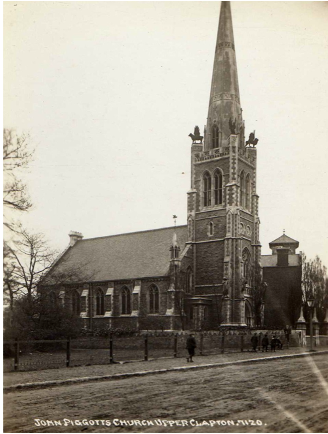
In 1896, Prince initiated the building of an ornate church later known as the Ark of the Covenant in Clapton. One of the first preachers appointed by the Church was Reverend John Hugh Smyth Pigott. Pigott was ordained a priest in 1883 by the Bishop of London, where he remained until 1884, later joining the Salvation Army. In November 1886, on the nomination of Rev H. Fishe, he was licensed to the curacy in Dublin by Lord Plunket, the Archbishop of Dublin, He soon left. Rev H. Fishe has stated: “That he found Pigott’s doctrine entirely contrary to his own and in his opinion were calculated to undermine the faith of his flock”[26] On leaving Dublin, Pigott, who was already familiar with Agapemonites, met Douglas Hamilton, Prince’s Secretary, and Eva Patterson, Prince’s illegitimate daughter born to Zoe Patterson. They are both credited for Pigott joining the Agapemonites.
Prince’s death in January 1899 left his community in shock because of his claim to immortality. Prince had portrayed himself as John the Baptist and later as the Messiah. He portrayed the Agapemone as a refuge from the apocalypse, for those living in it.[27] They hurriedly buried Prince in the middle of the night in the front garden, in an upright position, anticipating his revival. When that did not happen, members of the sect fell into despair and many Agapemonites deserted. Those who remained continued to await his return.
Three years passed without a leader. Rev John Hugh Smyth Pigott (1852-1927) then announced his claim to Messiahship and Divinity. With the help of his close associate, Mr Douglas Hamilton, he was appointed as Prince’s chosen successor. What were the motives behind this power grab? The luxurious Spaxton estate of 200 acres known as the Abode of Love, built by Prince from donations of the wealthy Agapemonites, now lay without a Heavenly Bridegroom. Prince had enjoyed a life of extravagance and pleasure. The finances were strong, as detailed by Joshua Schwieso in his PhD thesis on the Agapemonites, titled Deluded Inmates. He writes The Agapemonites wealth lay, for the most part, in stocks and shares. A number of inmates were described, in the various censuses, as fund holders or annuitants (that is person receiving an annuity).”[28] In addition, there were overseas followers that supported the sect.
The sect was largely run by financial contributions of the wealthy female Agapemonites. Pigott’s claim of Messiahship in September 1902 was the only way to reconcile the death of the Immortal Prince and his earlier claim that the second coming of Christ would occur in his person, which he often referred to as ‘Behold he Cometh’.[29] This gave Pigott the opportunity to take the mantle. The sect was now given a new lease of life.
Disorderly Scenes at Clapton
In the evening service of Sunday 7th September 1902, at the ‘Ark of Covenant’ in Clapton, Pigott announced himself as the second coming of Jesus Christ and declared his predecessor Prince a harbinger for his coming, just as John the Baptist had been for Christ. His claim was reported in the newspapers, which created public curiosity and gave him the desired publicity. The service of the following week of the 14th of September 1902, attracted a large and mainly hostile crowd. Pigott was attacked and heckled inside the church. Thousands were heard yelling and uttering threats at him while he was escorted away by the police.[30]
In the evening service of Sunday 7th September 1902, at the ‘Ark of Covenant’ in Clapton, Pigott announced himself as the second coming of Jesus Christ and declared his predecessor Prince a harbinger for his coming, just as John the Baptist had been for Christ. His claim was reported in the newspapers, which created public curiosity and gave him the desired publicity. The service of the following week of the 14th of September 1902, attracted a large and mainly hostile crowd. Pigott was attacked and heckled inside the church. Thousands were heard yelling and uttering threats at him while he was escorted away by the police.[30]
The Hackney and Kingsland Gazette on Wednesday 10th September 1902 reported the entire incident and also published the reaction of ministers and clergy who unanimously declared him delusional and mentioned the past scandals of the Agapemonites.
The Hackney and Kingsland Gazette stated:
The fact cannot be too widely known that the sect to which the Rev. Piggott belongs began in the grossest immorality[31]
Pigott fled to Spaxton, in West England, where he took up residence in the house-like church built by his predecessor, surrounded by the quarters of other members of the community. The residence had twelve-foot-high brick walls and was guarded by ferocious bloodhounds, far away from the city, which proved to be the safest place for Pigott’s plans for a future life of immorality. Apart from members, none were allowed in. However, the press maintained their curiosity with regards to the inner happenings of the Agapemone. These incidents were also reported by Mr Vachell who later served as prosecuting barrister at the trial under the Clergy Discipline Act of 1892, initiated by the Bishop of Bath and Wells to which we will short return.
The Promised Messiahas warning to Pigott
The Promised Messiahas was frequently informed about the daily activities of Dowie and under the instruction of the Promised Messiahas Hazrat Mufti Muhammad Sadiqra would read out some of the extracts from his paper ‘Leaves of Healing’.
Hazrat Mufti Muhammad Sadiqra was always on the lookout for western news and reports as he subscribed to many western newspapers and journals. Mufti sahib came across Pigott’s claim of Messiahship and Divinity and he wrote a letter to him inquiring about his claim. Although it is difficult to determine when exactly this letter was sent, research suggests that it was most likely in October 1902. Al Hakam reports two occasions where ‘The Freethinker’[32]was read out to the Promised Messiah(as) informing him about Pigott’s claim and about a new French claimant of Messiahship. (See Orignal)
The Promised Messiahas was further informed that Pigott had been attacked by a mob only to be rescued and escorted by the police.[33] (See Orignal) The events below are described in chronological order.
On 22nd October 1902, during his daily walk, Dowie and Pigott were both mentioned. With regards to Pigott, the Promised Messiah(as) stated:
These people are so anxious that in their anxiety they are crying out for the Messiah. The newspapers are the basis of their prominence. The newspapers of the Punjab as compared to theirs are but in name whereas they can inform hundreds of thousands of people a day over there. If Pigott opposes us more than Dowie, it will prove to be very effective. The Antichrist is just a metaphor for a group of people and Messiah means the one who travels. Both of them [Dowie and Pigott] claimed Prophethood and cut and perverted the books of God according to their own desire and then claimed Godhead in a philosophical sense… Pigott should definitely be written a letter. If he competes it will be very beneficial, and people will also pay heed [to us]. Mufti Muhammad Sadiqra replied that we have written to him.
The Promised Messiahas added: Compared to the Americans, the British are more linked with us. If he is challenged and in print, then it is hoped that Allah Almighty will show some Sign.[34](See Orignal)
The reply to Hazrat Mufti sahib’s earlier letter inquiring about his claim came from Pigott’s secretary, Mr Douglas Hamilton, in the form of a letter and two pamphlets, which were distributed in the church at the time of his claim. (See Orignal) The reply was read out to the Promised Messiah(as) on the 11th of November 1902. The heading of one of the leaflets was Noah’s Ark. The Promised Messiah(as) remarked:
Rational converse is respected and has lasting effect, but irrational thought loses its innovativeness in the space of a few lines.[35]Now our true Ark of Noah will dominate the false Ark. The Europeans used to say that false Messiahs are yet to come so firstly false Prophets and Messiahs stepped out in London and this will be followed by the voice of the true Messiah reaching London. It is also recorded in the Traditions that the Antichrist will claim Prophethood and Godhead for himself, so this nation has also manifestly fulfilled this. Dowie is claiming to be a Prophet in America and Pigott is claiming to be God in London and calls himself God.[36](See Orignal) (Scan2)
The Promised Messiah(as) wrote a small announcement and gave it to Maulana Muhammad Ali to be translated and sent to the West. Mufti sahib was also present, and he wrote that they both specifically noted two things from this announcement: it was brief, while usually the Promised Messiah(as) published detailed announcements and secondly, the Promised Messiah(as) ended the announcement with The Prophet, Mirza Ghulam Ahmad[37] thereby making his claim to Prophethood clear to the entire world. (See Orignal)
The announcement entitled A Warning to A Pretender to Divinity was sent on the 24th of November 1902 and widely published in the British Press.
Hazrat Mufti Muhammad Sadiqra also wrote a letter to Pigott advising him to repent from such a claim, which Jesusas had not desired for himself, even rejecting the title of “good” for himself, let alone “God”.[38]Mufti sahib further advised Pigott to accept the true Promised Messiah(as). He further warned him that should he persist in his claim of divinity, then Pigott should decree that Hazrat Mirza Ghulam Ahmad(as) should die in Pigott’s lifetime. He further said that Pigott should inform the Promised Messiah(as) of this verdict and ask him to also pray to God about this matter.[39](See Orignal)
Despite the wide publication of this announcement of the Promised Messiah(as), there was no reply from Pigott or his secretary. Following the evening congregational prayers on the 18th of November 1902, Dowies’s newspaper Leaves of Healing was read out, following which the Promised Messiah(as) remarked that Pigott’s fame is far greater than that of Dowie.[40](See Orignal)
During his morning walk the following day, the Promised Messiahas said regarding Pigott: People from these nations dare to make such claims because they have collectively accepted that the time is near for the Messiah to come. On the contrary, if people had largely been under the impression that it is not yet the appointed time, he (Pigott) would not have made his claim. Satan also has manifestations. Satan has chosen Pigott as his manifestation in this day and age.” He further said: “The root of the word Pigott is related to the word for swine. Now let us comprehend this Christian God as to whether he ascends to the heavens or is buried in the Earth. In actual fact, Almighty God has a great sense of honour against those who claim Godhead. His sense of honour does not need such people. In his [Pigott’s] estimation, Moses and all the Prophets (God forbid) are people of this Pigott and the other strange aspect is for two claimants to have arisen from one empire, a false one and a true one. And just as the plague is beneficial for us, similarly, Pigott has poked his neck out and everything that has been decided by God shall certainly be made evident in its entirety[41](See Orignal)
On the 20th of November, the Promised Messiah(as) received a revelation about Pigott.
Upon prayer with concentration concerning Pigott, The Promised Messiahas saw in a dream some books on which was written three times: Tasbih, Tasbih, Tasbih (Holiness belongs to Allah) and then received a revelation:
وَاللہ شَدِيدُ الْعِقَابِ ۔اِنَّھُمْ لَا یُحْسِنُون
Allah is severe in retribution. They are not acting righteously
This revelation indicates that the present condition of Pigott is not good or that he would not repent in future. It can also mean that he would not believe in God, or that what he has done by telling such a lie against God and planning against Him, is not good. The part [Allah is severe in retribution] shows that his end will be doomed, and he will be afflicted with God’s chastisement. Indeed, it is a very daring thing to claim to be God.[42](See Orignal) (Scan 2)
On 21st November 1902, the Promised Messiah(as) performed his Fajr prayer in congregation. After the prayer, the Promised Messiahas asked Sheikh Rehmatullah sahib of Lahore about his recent trip to London and further inquired about Pigott and whether he had gone to meet him. Sheikh sahib replied that he had received the letter of the Promised Messiah(as) a day before he was to depart for India. He went to Pigott’s house on the same day with two other friends. Upon knocking, an old man emerged. Sheikh sahib said that he wanted to meet Mr Pigott. The man replied he could only meet Mr Hamilton at that time. Sheikh sahib then asked to meet Mr Hamilton, but the man remained silent. Sheikh sahib asked him to deliver a message explaining that he had travelled seven thousand miles from India, where there is also a Muslim claimant to Messiahship.(See Orignal) He further stated that he wanted to be able to distinguish as to who was the true claimant. He asked why it was that a person who claims to be from God is unable to meet one who has travelled seven thousand miles to meet him. Yet the only reply he received was that Pigott could not meet him.[43](See Orignal)
On 20th January 1903, a report about Pigott was read from an English newspaper by Hazrat Mufti Muhammad Sadiqra. The Promised Messiah(as) remarked:
Such claimants were also born during the time of the Holy Prophetsaw who were destroyed. Soon, this will also be his fate. There is a revelation about him, ‘Allah is severe in retribution.[44](See Orignal)
On 27th April 1903, during an evening audience before late evening prayers (Isha), a discussion on dreams and its interpretation ensued. The Promised Messiah(as) explained that the view of a person who interprets a dream does not affect the actual interpretation because it is possible that he may interpret a dream as negative, whereas it holds a positive interpretation, or vice versa. In fact, it is true that the consequences of bad dreams are repealed through goodness and charity. Then a question was asked about taking an omen. The Promised Messiah(as) explained that the Holy Prophet(sa) had also taken an omen. Then the Promised Messiah(as) gave an example from his court case in Gurdaspur where a young man was also to be punished and he was thinking whether he would be punished or not?
In that instant he saw a young boy who was trying to tether a goat. When he succeeded, I concluded that the individual will be punished, and he was punished. He further stated ‘Once I went for a walk and a thought about Pigott emerged that how grand this contest is? Suddenly a person said Assalamoalaikum (Peace be upon you). From this I concluded that we will be victorious.[45](See Orignal)
On 23rd May 1908, a few days before his demise the Promised Messiahas delivered a speech after Zuhur prayers, while praising the efforts of Hazrat Mufti Muhammad Sadiq Sahib’sra he said:
“Mufti Muhammad Sadiq has a burning desire for the propagation of the Ahmadiyya Movement, and there is hardly any place in England where he has not corresponded with the English researchers or editors of the newspapers that he has come to know about and not communicated to them the claims of the Promised Messiahas, The sorrowful ending of Dowie of America and the pathetic failure of Piggot of London are the result of the efforts of the respected Mufti [Sadiq] Sahib. While he was the cause of destruction of Piggot and Dowie, he was also the cause of guidance for many fortunate souls. It was the result of his true and sincere efforts that some gentlemen and ladies of Europe and America accepted the truth of he Promised Messiah as and repented of their false beliefs. In short, Mufti Sahib does not need any introduction. The entire Ahmadi world knows his renowned name and is aware of his devotion, sincerity, and loyalty.[46] (See Orignal)
As mentioned in the previous section covering the chronology of events in Qadian, India, the Promised Messiah(as) had sent Pigott a warning to refrain from such a claim and challenged that if he would not stop, Pigott’s death was imminent within the lifetime of the Promised Messiah(as). There is no reason to believe that the Promised Messiah’s(as) warning did not reach Pigott because the challenge was widely published by the press and Mr Douglas Hamilton, his secretary, had replied to the initial letter of Hazrat Mufti Muhammad Sadiqra enquiring about his claim. They did however remain silent on the challenge sent by the Promised Messiahas. The major events of the above chronology are to be particularly borne in mind:
- Since the Promised Messiahas was informed about the claim of Pigott, the Promised Messiahas wanted Pigott to come forward in a spiritual contest. The statements such as “if Pigott opposes us”; “if he competes”, and “if he is challenged” clearly suggest that the warning sent on the 24th of November 1902 was indeed a challenge.
- Since the Promised Messiahas was informed about the claim of Pigott, the Promised Messiahas wanted Pigott to come forward in a spiritual contest. The statements such as “if Pigott opposes us”; “if he competes”, and “if he is challenged” clearly suggest that the warning sent on the 24th of November 1902 was indeed a challenge.(See Orignal)
- The Promised Messiah’s(as)warning was sent to Pigott and despite mass publication of the challengethere was no reply. The companion, Hazrat Mufti Muhammad Sadiq(ra), also wrote a letter, reiterating the message of the Promised Messiah(as) that if Pigott, is adamant about his claim, then he should reply to the challenge of the Promised Messiah(as) and decree as one claiming to be “divine” that Mirza Ghulam Ahmad(as) should perish in Pigott’s lifetime.
- The Promised Messiah(as) sent his companion to meet Pigott in order to receive a reply to his warning, but a meeting was denied. All these efforts to receive a reply to his warning should not have been made if the Promised Messiah(as) was making an unequivocal prophecy about Pigott’s death.
- The Promised Messiahas prophesied that Pigott and his movement will be doomed whereas his own community would be victorious.
- The words: If I die before Mr. Pigott, I am not the true Messiah nor am I from God cannot be read in isolationwhen a collective study of primary source material mentioned above clearly demonstrates that it was indeed a challenge, not an unequivocal prophecy, therefore his death within the lifetime of the Promised Messiahas was contingent upon his acceptance of that challenge, as suggested in the first letter written to him from Mufti Muhammad Sadiqra. If someone suggests that he considered the Promised Messiah’sas challenge as insignificant, then in the absence of a reply we should be able to see continuation in his public claim through its propagation as expected from a claimant of Messiah. The facts however demonstrate the opposite.
- The word repentance in the prophecy of the Promised Messiahas never implied that, unless Pigott accepted Islam, he would not escape death, for all the Christians share their disbelief in Islam. God does not compel anyone to accept Islam. It would be entirely irrational to prophesy that if a person did not accept Islam, he would die in a certain period of time. Therefore, his repentance was in relation to his change in behaviour and condition. Pigott would only be punished had he continued to publicly make his blasphemous claims. The Promised Messiahas has also explained this with regards to the Prophecy of Atham, he said: ‘It should be remembered that his retraction was from calling the Holy Prophetsa the Antichrist (Dajjal) and not from Christianity. The actual basis of this prophecy hinged upon this word [Dajjal] – a word which he had taken back when the prophecy was made.’[47](See Orignal)
(The word repentance was translated by Maulvi Muhammad Ali Sahib, the original written by the Promised Messiahas in urdu is yet to be found, it would be interesting to see what exact word was used by the Promised Messiahas). - Explaining the revelation Allah is severe in retribution. They are not acting righteously, the Promised Messiah(as) about the second part of the revelation اِنَّھُمْ لَا یُحْسِنُون wrote:
A. This revelation indicates that the present condition of Pigott is not good,
B. Or that he would not repent in future.(See Orignal) (Scan 2)
Or in the sentence clearly points to one of the two possibilities, that his current condition is not good which we can be confirmed through primary source material that the backlash he received at Clapton made him flee to Spaxton. The change in that current condition which was described as ‘not good’ was brought about by fleeing London and withdrawal from making any further public claims. Whereas the second possibility of ‘he would not repent in future‘ is an opposite outcome which means he would reply to the challenge and continue with the propagation of his public claim resulting in his death in the lifetime of the Promised Messiahas. The case of Dowie should serve as a precedent in this case.
Much of the newspaper reports on Mr Pigott was regarded as hearsay by the ecclesiastical authorities which we will discuss below in detail.[48] The challenge, however, was concerning his public claim.[49] - The reason a letter was sent to Pigott and Dowie and not to other such claimants of the time[50] is because their claim had reached Qadian, demonstrating that initially it was a public claim. It is interesting to note that only two men were sent a warning when the Promised Messiah(as) was also informed of another French claimant at the same time he was informed about Pigott, who was later arrested and sent to a mental health penitentiary.[51] The purpose of the Promised Messiah’s(as)advent was not to send warnings to every individual who thought himself to be the Messiah. However, those who had temporarily succeeded to some degree in misguiding the public and announced their claims publicly were to be warned.
- The Promised Messiahas statement of 23rd May 1908 demonstrates that he was not waiting for the death of Pigott as the fulfilment of his prophecy, rather his ( وعید) warning to the false pretender and Pigott’s complete silence in response, and his retraction from making any further public claims was considered his pathetic failure, which proved sufficient in demonstrating that the purpose of the warning was achieved. The Promised Messiahas stated: “The sorrowful ending of Dowie of America and the pathetic failure of Piggot of London are the result of the efforts of the respected Mufti [Sadiq] Sahib. While he was the cause of destruction of Piggot and Dowie, he was also the cause of guidance for many fortunate souls.[52] (Read Orignal)
The life of true prophets of God are an example of this standard. Their public claims even during utmost opposition and persecution are not retracted. Instead, each step they take is to advance their claims. The life of the Holy Prophet(sa) is a perfect example for this not only in that he was offered the bounties of this world by the pagan Meccans to let go of his claims but was also severely persecuted for it. In both circumstances, he never compromised his belief. Similarly, the first Messiah, Jesus of Nazareth(as), despite the persecution, conveyed the message of God to the people. The second Messiah, Hazrat Mirza Ghulam Ahmad(as) also faced much bitter opposition from the Muslims, Christians, and Hindus, when he published his claims before the world. Indeed, he proclaimed that there was not a single clergyman in India whom his claim had not reached. He invited people to listen to his claim and his disciples preached openly and distributed hundreds of thousands of publications throughout the world.
The Promised Messiahas writes:
“Similarly, 20,000 leaflets in English and Urdu were printed and more than 12,000 of these were sent as registered post to the leaders of such opponents. In India, there was not a single Christian priest who had not been sent this announcement as registered post. People in Europe and America were also sent this announcement through registered mail as an ultimatum. Is it not a wonder that with only very meagre means this huge work goes on?”[53]
An example of this public announcement, sent as registered post by the Promised Messiah(as),inviting prominent members of society to witness the truth of his claim in Qadian could be found in the journal ‘The Theosophist’ published by Henry Steel Olcott the head of the Theosophical Society Henry Steel Olcott[54]. Similarly, the Cork Constitution an Ireland based newspaper as part of their London correspondence section reported about Mr Charles Bradlaugh, (a political activist and atheist who found the National Secular Society in 1866) receiving this invitation from the Promised Messiahas. He at the time of receiving this invitation was serving as the liberal MP of Northampton.[55] There were many westerns who visited Qadian, some out of curiosity and others to verify and discuss the claims of the Promised Messiah(as). The Promised Messiah(as) always urged them to stay for a few weeks at his expense in order to fully comprehend his claims, whether it was Mr DD. Dixon who visited Qadian in November 1901[56] or Mr Charles Francis who visited Qadian in October 1903[57] and later accepted the Promised Messiahas in April 1906.[58]
In contrast, when we look at Pigott, we see that he lived the life of affluence, with wealth acquired through swindling and deception. Every opportunity was at hand to convey his message to the entire world but as one newspaper put it, “for what he was “out for” was plenty of cash”.[59] After the initial announcement in the Ark there were no further public claims of his divinity or messiahship thereafter. There are some newspaper reports from 1902 onwards which are often presented by the opponents of the Promised Messiah’s(as), to suggest that he persisted in his public claims. However, as we shall now see, new research demonstrates that these statements attributed to Pigott, if made, were done so in private and not published to the world. To this we will now turn our attention.
Ecclesiastical law, Blasphemy and the Defrocking of John Hugh Smyth under the Clergy Discipline Act 1892
We have mentioned the events above and the conversations of the Promised Messiah(as) in a chronological order, so as to present and evaluate the complete facts regarding this prophecy. Indeed, the facts are that Pigott never responded to the challenge and denied meeting the companion of the Promised Messiah(as), and with his escape to Somerset, lived the rest of his life in secrecy, away from the public, without publicly repeating his claim. The case below will bring home these facts in a particular vivid and striking manner.
Now we evaluate the prophecy in light of Ecclesiastical law, Blasphemy and in particular the case brought forward by the Bishop of Bath and Wells, George Wyndham Kennion against Rev. J. H. Pigott in 1908 as it provides an insight into how Pigott had retracted from making public claims to Messiahship.
The case was heard in the consistory court of the Diocese of Bath and Wells under Section 2 of Clergy Discipline Act, 1892 and contrary to the 109th canon issued by the convocation in the province of Canterbury in the year 1603, to wit, “Adultery, uncleanness, and wickedness of life”.
There were three charges brought forward against Mr Pigott: that he was guilty of Immoral Acts, Immoral conduct, and Immoral habits, by having a sexual relationship with Ruth Ann Preece, proven by the birth of his two illegitimate children in the years 1904 to 1908. The research deals with the obvious question of why Pigott was not charged with blasphemy if he had insisted on his claims of divinity and messiahship after his initial announcement in September 1902? Blasphemy had been the preferred charge of choice by the Church for centuries and it was a charge that was often used against those who disagreed with the Church’s orthodox views. Before delving into the details of the case, it is important to understand the historical power of Ecclesiastical law, which included blasphemy.
A Brief History of Ecclesiastical Law and Blasphemy
Ecclesiastical law or Canon Law refers to the ordinances and regulations made by the ecclesiastical authority (Church Leadership). It is clear that, prior to the reformation,[60] medieval Roman Canon Law was the Law of the English Church and under the jurisdiction of the Pope of Rome in medieval England, was also referred to as ‘Law of the Holy Church’.
The Church of England renounced papal authority in 1534 when King Henry VIII was denied the right to the annulment of his marriage to his wife Catharine of Aragon by the Pope.[61] The common law of England, however, is accepted to be largely influenced by Canon and Civil law of Rome.[62] Blasphemy laws were a part of the common law in England when the Church and state was one entity. Blasphemy against Christianity was considered an attack on State, its laws and Government because Christianity was synonymous with the laws of England, thus criticising the Christian faith equated to subversion of the law.[63] Later, with time, the power of Ecclesiastical courts was left to dealing with Church administrative and spiritual matters only.
Religious Impostors
One form of blasphemy, among many mentioned by Sir William Blackstone in his commentaries on the laws of England,[64] concerns religious impostors. In his fourth book of commentary under the Chapter IV: Of Offences Against God and Religion he writes:
“VII. A seventh species of offenders in this class are all religious impostors: such as falsely pretend an extraordinary commission from heaven or terrify and abuse the people with false denunciations of judgments. These, as tending to subvert all religion by bringing it into ridicule and contempt, are punishable by the temporal courts with fine, imprisonment, and infamous corporal punishment.”[65]
There is a list of pretenders claiming to be Christ in the Christian Faith. Ronald Matthews in his book The English Messiahs mentions six such religious pretenders from the 17th to the 20th century who had attracted some followers, including John Hugh Smyth Pigott. One such pretender was James Nayler who is known as The Quakers Jesus. In 1656 he was tried and narrowly missed the death penalty by vote in parliament. He was horrifically punished by being set on pillory, whipped, and had his tongue bored through with a hot iron and was then imprisoned for two years.[66] This was the most extreme punishment meted out to a pretender by the parliament. Subsequent pretenders making such claims were either considered insane as in the case of Richard Brothers[67], or rebellious, such as John Nichols Tom, who instigated a peasants uprising which resulted in a confrontation with the army and his death.[68]
Blasphemy was considered an Ecclesiastical offence. Therefore, Ecclesiastical courts often had a degree of temporal jurisdiction until the year 1640, when most of their secular coercive power was revoked by statute in 1676. The death penalty was also revoked, the Ecclesiastical courts were left with spiritual sanctions of Penance, deprivation, degradation, and excommunication.[69]
From the 16th century to the mid-19th century, blasphemy was an offence against the common law[70]. Although the Blasphemy Act 1697 further strengthened the indictment as it now became a statutory and common law offence, a solid definition remained vague. The Law on the most part punished atheists, unitarians and specifically those who made public blasphemous utterances or published such works. Thus, blasphemy which was considered similar to treason and punishable by death[71] later became a public order issue, looking at the intent of the insult and the individual sensibility involved. Later still, by the late 18th century the law became more tolerant of allowing criticism of the Church on the basis of legitimacy of intention.[72] This age may be regarded as a struggle between freedom of expression and responsibility.[73] [74]
The 20th century saw governments and authorities retreating from the use of law except where issues of public order were paramount. David Nash the author of Analysing the History of Religious Crime, Models of “Passive” and “Active” Blasphemy since the Medieval Period concludes:
“Thus, blasphemy originated as a ‘passive’ offence whereby individuals could expect protection for their beliefs and damage to these from the sanctions offered by both secular and temporal authority. It then became an issue of conformity that sat easily alongside other ancient regime forms of discipline. This mould was broken by the enlightenment’s questions about the scope and nature of authority. The subsequent development of individual rights made the state retreat from its policing role, thus giving birth to the ‘active’ blasphemy model which required the individual to demonstrate damage to religious beliefs.”[75]
As secular law gained dominance, the use of blasphemy laws became increasingly redundant and was used for public order reasons only. Ecclesiastical courts could still punish for blasphemy, but their punishment was limited to deprivation, degradation and excommunication as their jurisdiction was now only spiritual in nature.[76]
Clergy Discipline Act 1892
This transition of power was reflected in the Church Discipline Act 1840 being replaced by the Clergy Discipline Act 1892, which provided procedures for the hearing of complaints against clergy on moral issues. It was not a smooth transition, but ultimately secular law prevailed.
‘In the Clergy Discipline Act 1892, parliament again attempted to legislate for the behaviour of clergy, this time in the sphere of morality, rather than worship and doctrine. The Church Discipline Act 1840 was repealed and replaced with provisions for hearing cases before the Consistory Court.’[77]
With this context we now examine the case that was brought against Pigott by the Church. This research is primarily based on the actual court documents, witness statements and letters included in the court proceeding of the case brought against Mr Pigott from the Somerset Archives. The newspapers are then presented as a secondary source, as it is hard to separate facts from fiction when researching this sect merely through the eyes of the half penny press – as it had become a sort of an entertainment at the time for readers, and the press is well known for sensationalising scandalous stories to promote sales. Even today, inaccurate stories are published that are subsequently refuted or disclaimed. In the case brought forward by The Bishop of Bath and Wells against Pigott, the newspapers wrote much on the course of action that they claimed was going to be taken by the bishop, which was subsequently refuted by the bishop himself in an interview.[78]
The Bishop of Bath and Wells Advances with Legal Proceedings
George Wyndham Kennion, the Bishop of Bath and Wells was an Englishman born in Harrogate England on 5 September 1845. He had studied at Eton College and later graduated from Oxford university. He served as a Bishop of Adelaide from 1882 to 1894 and later was appointed as the Bishop in the Diocese of Bath and Wells.[79]
George Wyndham Kennion was described in the memorial at the famous Wells cathedral as ‘A True Pastor, a just administrator, zealous for the missionary work of the church and for the restoration of faith’
Being among the highest authorities of the Church of England, the Bishop of Bath and Wells, was well aware of the blasphemy and immoral conduct of Pigott. The bishop had for a while been encouraged to act against him. Below is a letter addressed to the bishop that is at the Somerset heritage centre under the file ref: D/D/bd/37, urging the bishop to take action against this imposter and blasphemer, who was accused of running a brothel.
He writes “Many devout Christians besides editors of various newspapers have been surprised at the passive attitude you have adopted towards that arch imposter Smyth Pigott and the time has arrived for you to exercise the power you have to bring him to Justice. Every right-minded man regards Pigott as an unbridled blasphemous libertine; this heinous abomination should be immediately stopped.”[80]
The illegitimate birth of Power Pigott’s daughter was reported in the press[81]and registered with the local registrar as such, leaving little room for the bishop to ignore it. Professor Joshua John Schwieso in his PhD thesis Deluded Inmates writes:
The birth of Power Smyth-Pigott galvanised the Anglican authorities into action[82]
The bishop is the highest authority in his Diocese and each Diocese has its own consistory court, equivalent to a high court in the secular jurisdiction. The bishop decided to proceed with the case against Pigott in the consistory court of the Diocese of Bath and Wells under section 2 of Clergy Discipline Act, 1892 and contrary to the 75th and specifically the 109th canon issued by the convocation in the province of Canterbury in the year 1603, to wit, “Adultery, uncleanness, and wickedness of life”.
The case was reported by the Evening Express of 20th Jan 1909 as:
A trial unparalleled in the history of the ecclesiastical courts.
Another Local newspaper ‘Taunton Courier’ on 27 January 1909 described it as:
One of the most remarkable ever held within the walls of Wells Cathedral during the thousand years.
There were three charges of immorality brought forward against Mr Pigott:
- That during the years 1904 and 1905 while residing at the Agapemone in Spaxton in the diocese of Bath and Wells, he was guilty of Immoral Acts, Immoral Conduct, and Immoral Habits within the meaning of the above-mentioned Clergy Discipline Act 1892 and 109th Canon. This complaint covered the period of the birth of his illegitimate daughter from Ruth Preece, named Glory.
- The second complaint covered the period 1907-1908 which is to do with the birth of the second child named ‘Power’.
- The third complaint in general terms covered the period of last five years that he was guilty of Immoral Acts, Immoral conduct, and Immoral habits.
The authorities made several futile attempts to deliver the complaints to the defendant by hand, the deliverer on every occasion would demand for the complaint to be given in the hand of Pigott, yet various excuses for his absence made this ineffective. Therefore, the court had to resort to delivering notice of the trial by registered delivery. A handwriting expert was assigned to determine the identity of Pigott, as he was ordained a priest and had signed the birth certificates of his children. The handwriting expert examining those signatures from 1882 to 1905 concluded that all the documents had been signed by the same person i.e., Pigott.[83] The photographs of Pigott’s marriage to Catherine (his first wife) at the time of their marriage were obtained and shown to the birth registrar, who had been invited to the Agapemone to register the birth of Pigott’s child Power born to Ruth Preece. The registrar was able to testify that the mother of the child was not Catherine, Pigott’s wife as seen in their marriage photograph.[84]
In the interview given to Mr Frank Edward Francombe on 15 Feb 1905[85], Pigott suggested that they are above the ordinarily accepted code of morality. Pigott says:
There is no such thing as marriage, we that live here are brothers and sisters in spirit, we are above the world and the ways of the world. Those who are in the spirit can commit no sin – for us there is no such thing as sin.”
Francombe asks: Do I understand that you live here together in promiscuous adultery? Pigott: “We do not call it that. Sexual intercourse is the highest form of spiritual worship” Mr Hamilton later confirms and calls it, “Glorious Doctrine of Sinless Perfection”.[86]
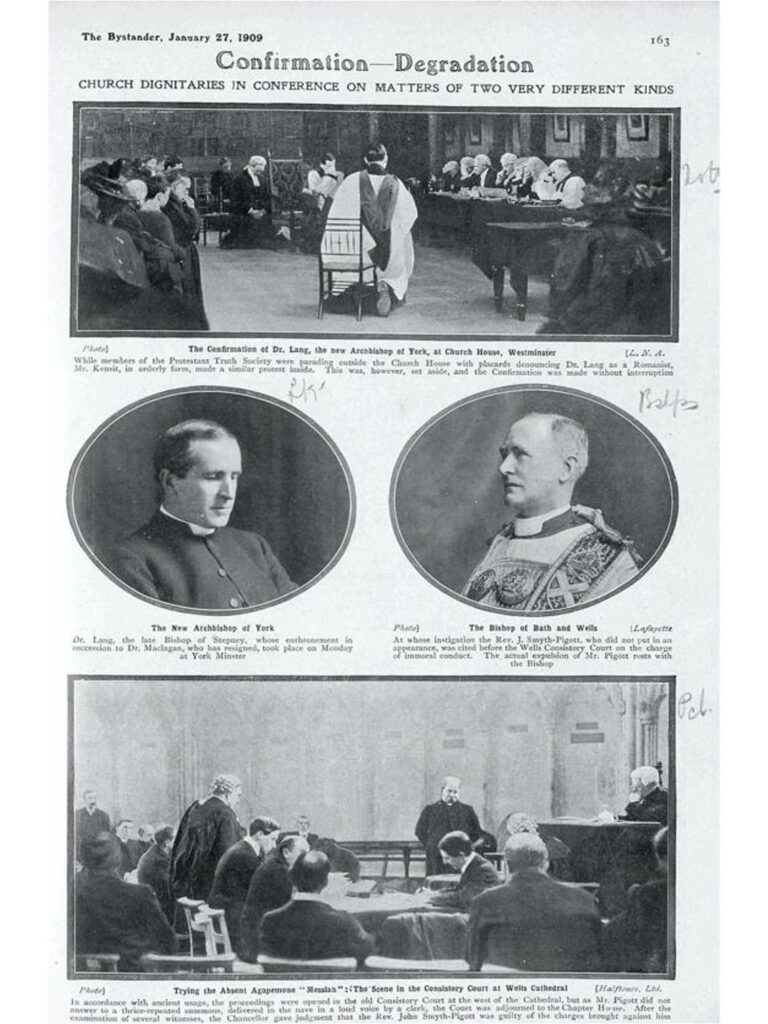
Similarly, all communications addressed to Pigott were refused, according to the Postmistress of the Spaxton sub-post office. She confirmed that Mr Read Pigott’s Secretary usually appears with the handwritten permission of Mr Pigott to take the post and he had refused to take the official letter. The trial was presided over by the Chancellor Chadwyck- Healey., C.B., K.C. on Wednesday 20th January 1909 in the absentia of Mr Pigott. Charles Stoke Read, Pigott’s secretary was present, when after the appearance of all the witnesses and their statements, the Chancellor concluded and announced that Pigott was guilty on account of all charges and must pay all court costs, pending Bishop’s final decision.[87] The final announcement of defrocking came six weeks later made by the Bishop of Bath and Wells on Saturday 6th March 1909.
Reading between the lines, the quandary over jurisdiction
There are a few unanswered questions, specifically:
- Could a charge of blasphemy have been included under the Clergy Discipline Act 1892 and was Blasphemy under the Jurisdiction of the Ecclesiastical Court or would it have had to go through the Courts of Realm?
- Why did the bishop not prosecute Pigott for his blasphemous claims of being divine and Messiah despite the Blasphemy Law of 1697 being still intact, it not being until 1967 that it was abolished by the Criminal Act, when ‘all religious impostors’ were included by William Blackstone under the seventh species of blasphemers mentioned above?[88]
The jurisdictional evolution of a secular court and an ecclesiastical court is a complicated subject; however, it is simpler to express this much that a secular court has an overall authority and is superior to an ecclesiastical court and although the jurisdiction of the indictment of blasphemy under the Blasphemy Act 1697 lay with the temporal courts and so a case under Blasphemy Act 1697 will proceed through a secular court that is not to say that blasphemy could not be discussed in an ecclesiastical court or that the Bishop could not initiate the proceedings in a secular court.
The question whether blasphemy could be tried in a consistory court can be understood from Dr G.R. Evans[89] book Discipline and Justice in the Church of England. In her book she discussed the relationship and jurisdictions between Ecclesiastical and Temporal courts in relation to a case, and she mentions that although the secular law has an overall authority over Ecclesiastical law, there are times where ‘law is enforced by both the ecclesiastical and the temporal courts’. She further writes:
“Although it was argued…that ‘the law is one, but jurisdiction as to its enforcement is divided between the ecclesiastical courts and the temporal courts’, the fact would appear to be that its enforcement may run through both ecclesiastical and secular courts, both as to persons and as to matters for litigation. In principle a priest’s license may be revoked for a secular crime even if the cleric has not been convicted of it. This would suggest that while trial for an ecclesiastical offense cannot take place in a secular court, trial for a secular offense can in effect take place in an ecclesiastical court. Furthermore, a cleric could be tried for a criminal offense and sentenced for it in a secular court and then sentenced again by an ecclesiastical court because he had been found guilty of a criminal offense. And, as was emphasised in Ex parte Denison (1854), a trial in an ecclesiastical court is itself a criminal trial.”[90]
There is a distinction between being legally unable to charge under blasphemy and that of not opting for the option of blasphemy. In the case of Pigott it was the latter and although there could be other factors such as blasphemy cases were likely to be fraught with legal difficulty and the enforcement of blasphemy law only taking place if it was a public order issue in the late nineteenth and the early twentieth century, nevertheless it is not to say that Blasphemy was an obsolete offence. The case of Harry Boulter in 1908 was the closest in time to Pigott’s case, where Boulter was charged and prosecuted under Blasphemy for making profane utterances at Hyde Park.[91] The grounds for prosecution were both, the utterances were to have been made in public and damage to the feelings of others. This was considered as open blasphemy. The last person sent to prison for Blasphemy was John William Gott, he was imprisoned numerous times for his remarks and publications on opposing or mocking Christian faith, his final arrest was in 1921 for publishing material against Christianity.
Giving the judgement at the Court of Appeal, Lord Trevethin C.J. said:
It does not require a person of strong religious feelings to be outraged by a description of Jesus Christ entering Jerusalem “like a circus clown on the back of two donkeys”. There are other passages in the pamphlets equally offensive to anyone in sympathy with the Christian religion, whether he be a strong Christian, or a lukewarm Christian, or merely a person sympathizing with their ideals. Such a person might be provoked to a breach of the peace.”[92]
It is evidently clear that vast majority of those punished under blasphemy during the time under discussion were done so for public order issue, this clearly required public proclamation or publication. It is worth noting that Pigott did receive a police caution at the time of his initial claim in 1902 at Clapton Church.[93] We have discussed above in the section of Disorderly scenes at Clapham how Pigott fled to Spaxton and thereafter lived a life of complete secrecy behind four walls.
Thus, the choice of not opting for blasphemy in the case of Pigott makes it clear that due to the cloak of secrecy maintained, they would not be able to prove it in the court, this could be further understood in the case of immorality brought against Pigott where he had not put in a single appearance and avoided cross examination by the Chancellor, cross examination which may have substantiated a conviction of blasphemy. As for what one believes or says in the four walls of his house is not the concern of anyone and nor can it be ascertained without the confirmation of the claimant himself. Yet when such a claim is announced publicly, the claimant is expected to face all opposition like the true claimants of the past. We have a long list of those punished under the Blasphemy law from the 14th to the 20th century for their vile criticism of Christianity or for atheistic proclamations and have found them to be braver than Pigott, who had every opportunity at hand to propagate his claim,[94] yet decided to remain hidden in acts of immorality and never repeated or propagated his claim publicly.
The way in which Pigott protected his privacy can be observed from the reported encounter he had with Mr A.M. Muirhead, a journalist at Spaxton who wanted to interview him after seeing Pigott leave Agapemone in the motor car. Muirhead followed Pigott’s car and after a long chase caught up with him near Taunton railway station. Upon calling him by name Mr Pigott tried to escape by walking away briskly. After a short pursuit, he then stopped and said:
“Why do you follow me I cannot understand it…what do the public want to know of my doings for?” He further said “There is nothing to discover, we are ordinary people, who live quietly and do not interfere with anyone. It is simply a gentleman’s home, with which no law can interfere.”[95]
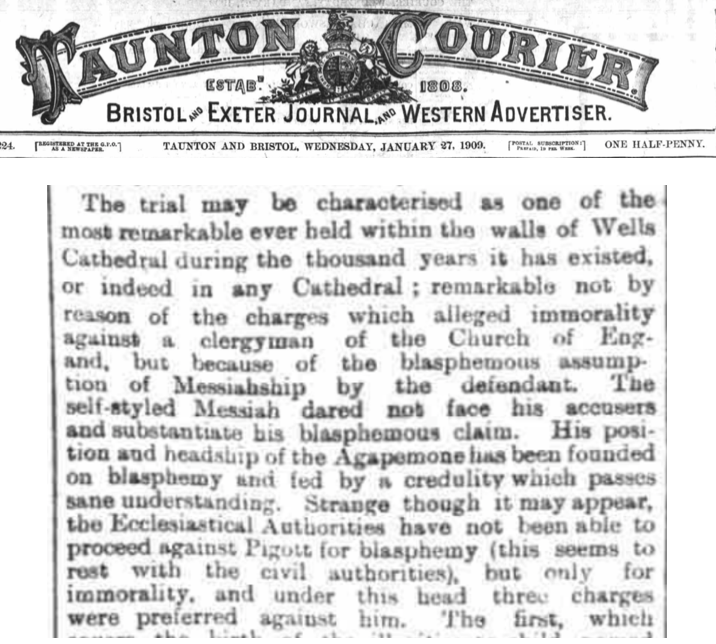
Another local newspaper commenting on the case wrote: “The trial may be characterized as one of the most remarkable ever held within the walls of Wells Cathedral during the thousand years; remarkable not by reason of the charges which alleged immorality against clergyman of the Church of England but because of the blasphemous assumption of Messiahship by the defendant. The self-styled Messiah dared not face his accusers and substantiate his blasphemous claim. His position and headship of the Agapemone has been founded on blasphemy and fed by a credulity which passes sane understanding.”[96]
Blasphemy an obsolete offence?
There was great curiosity about the route that would be taken in the case of Mr Pigott. The Weekly Dispatch October 4, 1908, published an opinion of Alfred Fellows, a Barrister at Law under the heading ‘How Smyth Pigott can be prosecuted’. He underlines three indictments that should succeed in prosecuting Pigott and the very first on the list is blasphemy.
He writes: First, Smyth-Pigott could be convicted of blasphemy. It might have been urged with reason a year ago that this was really an obsolete offence, but since a prosecution has just taken place and the prisoner was convicted, this excuse fails. Boulter was, in effect, prosecuted because of the obscenity of his language, though no one need have stayed to listen, and obscene language is painfully in evidence in every crowded street. Smyth-Pigott, the father of “Glory,” calls himself the Messiah of the Christians, and must be tolerated by every Englishman indefinitely. A possible plea would be that since blasphemy is denial of the Scriptures, no conviction could ensue, as Smyth-Pigott does not deny them. But a strong judge would tell the jury that bringing them into ridicule and contempt was also blasphemy and would have ample warrant for doing so. With such a charge a British jury might safely be trusted.[97]
It is evident from the Barristers remarks and from the case of Harry Boulter mentioned earlier that the Blasphemy Law was operative and could have been used in order to prosecute Mr Pigott, if an open blasphemy could be proven by showing that he has brought the scriptures into ridicule and contempt by repeating, propagating or publishing his claims of divinity and messiahship publicly, however as we have observed, this was not the case as no open blasphemy could be proven.
Mr. Beverly R. Vachell was instructed by Mr. R. G. Harris solicitor and the Secretary to Lord Bishop to represent the case under immorality on behalf of the bishop[98]. whereas there was no official representation from Pigott and since the citations could not be delivered to him by hand, it was proved that there had been a substituted service of citation by post.
Mr. Vachell in the Instructions for Preliminary Conference on Evidence wrote:
“Much has been circulated in the newspaper about Mr Smyth Pigott, the self-styled Messiah and the life he is leading in the Agapemone. But owing to the secrecy maintained and the difficulty of access to this institution there will probably be considerable difficulty in obtaining legal proofs”[99]
The statement of Mr Vachell in a case which seems quite straightforward truly sheds light upon the seclusion and secrecy that was maintained by Mr Pigott. To Mr Vachell, the secrecy would pose difficulty to obtain evidence in this case. It took months to collect the necessary evidence to convict Mr Pigott under immorality and have him defrocked. The Bridgwater Mercury on the 25 November 1908 wrote:
Mr. Harris, of the firm of Harris and Harris, Wells, and the Bishop’s Registrar, has been for months collecting evidence with a view to a prosecution, but every step is fraught with difficulty, and no one knows this better than the Rev. Smyth-Pigott. Twice he has avoided service of formal complaint, and efforts are now being made to serve him personally. Should these fail it has been decided to serve him by substitution, for the Bishop is determined to bring him to book. It is not likely that the Rev. Smyth-Pigott will dare face the Chancellor and the searching cross-examination of counsel.
Pigott Defrocked
The above makes it evidently clear that even for immorality charges under Clergy Discipline Act 1892, it was very difficult to obtain proof despite the abundance of reports mentioned in the press on the notorious sect. As for the charge of blasphemy this would have been impossible to prove, as all of the statements credited to Mr Pigott by the newspapers were not public proclamations or published claims. In the eyes of the law, newspaper reports were not sufficient to convict someone, especially in the absence of any public proclamations. This view is supported by the pronouncement of the Bishop in March 1909.
On Saturday 6th March 1909 the bishop announced the defrocking of John Hugh Smyth Pigott for immorality charges under Clergy Discipline Act 1892. Before reading out the official wording of sentence of deposing given to the bishop by the chancellor Chadwyck-Healey, the Bishop began:
This is the case of one who has brought, as many persons think, great shame and sorrow upon not only the Church of England, but upon the whole Christian Community. In our procedure all that the Ecclesiastical Law allows of has been undertaken and carried through its various stages with scrupulous care. The full statutory time has been allowed for appeal against the judgment which it was my sorrowful duty to pronounce in January last. As a corollary of that judgment, I have a still more serious sentence to pronounce today. To some it must appear a strange fact that no charge has been brought against the defendant for the blasphemous utterances with which he has been credited. I would observe that there is grave doubt whether under the Clergy Discipline Act, under which the last proceedings were taken, a prosecution for blasphemy could have been included. If it could have been included, it is not easy to see how any other punishment could have been imposed than it is my painful duty to now inflict.[100]
The above was the statement made by the bishop prior to announcing the sentence however Bishops private notes at the Somerset Archive shed light on why the bishop opted for Immorality instead of Blasphemy. This reiterates the fact that Pigott did not repeat his blasphemous claim in public.
To some it must appear a strange fact that no charge has been brought against the defendant for the blasphemous utterances with which he has been credited. Upon this I would observe, in addition to the point to be borne in mind that these utterances are asserted to have been made in a private house and not published to the world. It is not clear that the Clergy Discipline Act under which the late proceedings were taken does not admit of the charge of Blasphemy being brought. Indeed, such charges are now dealt within the courts of Realm other than the ecclesiastical courts. And in a manner, it may be said that the state relieves the Church of the difficult burden of dealing with the serious matter of open blasphemy. The Church of England therefore is now doing all that the law admits of in this most sad and serious case, and in fulfilment of the duties of my office I now proceed to pass sentence.[101]
The bishop’s statement of being unsure whether Blasphemy could have been included is to do with the addition of Blasphemy under the Clergy Discipline Act 1892 which mainly looked at moral issues of clergy, which the bishop had opted for. However, as mentioned before, in accordance with the available evidence, the bishop opted for an indictment which guaranteed Pigott’s defrocking. He is also right to say that he is not sure what other punishment could have been imposed apart from the one he had announced as the jurisdiction of an ecclesiastical court was merely spiritual.
One obvious question that could be asked is why could the initial claim of Pigott in 1902 at Clapton not be used to prosecute him under blasphemy? The reason being is that as per the Blasphemy Act 1697/98, such an offence was to be reported upon oath within four days and prosecution to peruse within three months:
II. No Prosecution except on Information before Justice upon Oath within Four Days.
Provided always and be it enacted by the Authority aforesaid That no Person shall be prosecuted by virtue of this Act for any Words spoken unless the Information of such Words shall be given upon Oath before One or more Justice or Justices of the Peace within Four Days after such Words spoken and the Prosecution of such Offence be within Three Months after such Information.[102]
Dr Schwieso in his Ph.D. thesis rightly identifies the reason of bishop not opting for blasphemy, he writes: “The authorities had to proceed cautiously. They seem to have decided that it would be impossible to achieve a conviction on the grounds of blasphemy.”[103]
The question remains that if Pigott was still adamant on propagating his claims as suggested by the opponents of the Promised Messiahas, then why would it be impossible to achieve a conviction on the grounds of blasphemy?
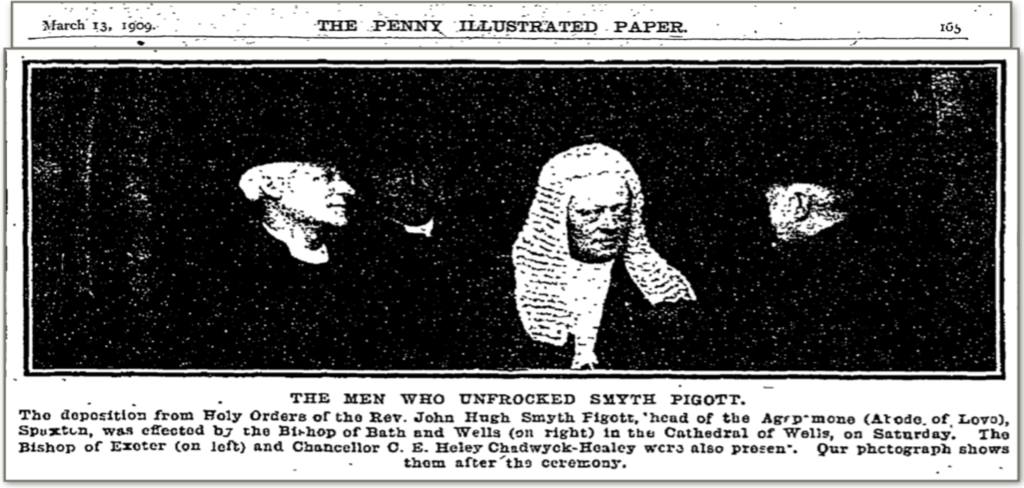
The Problem with Reliance upon Newspapers Alone
The newspapers are only presented as a secondary source in our work as it is difficult to separate facts from fiction when researching this sect merely through the eyes of the press as this issue had become a means of public entertainment at the time for the readers, and the press is well known for exaggerating scandalous stories to sell papers.
As discussed earlier, the Press published scandalous and controversial stories which could never be taken as a primary source because it is difficult to differentiate between facts and fiction through them. Thus, in the case of Pigott’s silence and secrecy, such newspapers should be accepted which are in accordance with the historical facts of that time as evident from the official court documents. The case itself demonstrates that the newspaper reports were never accepted as evidence by the bishop, and he categorically discredited them saying: “Like many other of the statements regarding the Agapemone which have appeared in the half-penny press exists only in the imagination of the writers of these stories[104]”
Thus, during the lifetime of Pigott all of the claims mentioned in the newspapers after 1902 were rendered as mere stories. It was impossible to convict him under blasphemy as there was no continuation of public or published claim post 1902. As for his privy matters, they could not be validated by the bishop, nor were that his concern. Another point to be borne in mind is that it is paramount for an honest researcher to not completely rely on a single opinion or reference in order to reach a sound conclusion. Rather one should always consider other opinions. Among many newspapers, Coventry Herald Friday 23 January 1903 published the words of the Promised Messiah(as) and understood it to be a challenge that Pigott would surely respond to if he was true in his claim of Messiahship and Divinity.
It reads: “The Confidence therefore, with which he stakes his reputation upon the prior decease of Clapton pretender shows a sportsmanlike, as well as a prophetic instinct. I trust that Pigott will take up the challenge and issue a counterblast against Mirza Ghulam Ahmad. The two prophets can then each pray his hardest for the early decease of the other”[105]
This point is also evident when we compare this to the prophecy of Dowie. Not only did Dowie respond with the utmost disrespect but he also arranged the largest evangelical trip to New York at Madison Square Garden to convey his claim of Prophethood publicly. The Promised Messiah(as) had published on the 23rd of August 1903 that “If Mr. Dowie flees from this confrontation—even then, the calamity will certainly befall his Zion soon”[106] and about a month later Dowie was caught by the wrath of God which resulted in his miserable death under the prophecy of the Promised Messiahas. In contrast, after his initial claim, Pigott went into hiding and never repeated his claim publicly, nor did he respond to the warning of the Promised Messiah(as).
There are also newspaper reports confirming that post 1902 agapemone remained no more than a secret practice, one such report states: The gathering was only open to the elect, young ladies being stationed at various points to prevent surreptitious entry of unbelievers[107].Taunton Courier and Western Advertiseron Wednesday 29 June 1904 wrote: he rarely appears outside the walls of his carefully guarded temple of mystery. The Chard and Ilminster News on Saturday Sept 15, 1906, reported about his leaked messages: He feared leakages in a printing office by which his special messages might get to the outer world…The result of all this secrecy and precaution is that extracts from these notes have never been published.
The opponents of the Promised Messiahas often mention that when Pigott was defrocked he had stated “I am God; it does not matter what they do,” which shows that he did not repent. This statement is not mentioned in any official records or newspapers of 1909 during our research. Pigott avoided and ignored every summon to the court. He simply did not appear in public, so the question is, where and when did he make this statement? Was it within the four walls of his home? Hence such a statement, even if it was made, cannot be regarded as a claim and in any case, it is not until after his death that this statement came to surface.
On page111 McCormick in his book Temple of Love (first published in 1962) mentions a statement of Pigott without giving any reference for it. The only reference we have found is in the Nottingham Evening Post on March 21, 1927, which mentions Pigott’s obituary. A statement made in 1909, to have been mentioned in 1927 with no reference to the original statement, is not credible at all, nor does it constitute a public claim from an evading Pigott. The fact that this statement is nowhere to be found to have been made in the year 1909 clearly points towards the problem involved in relying on secondary sources. Dr Joshua Schwieso discredits McCormick for his use of secondary sources.[108] He writes: McCormick is very poor at referencing his material. He quotes from a number of badly acknowledged sources that have proved impossible to trace.[109] A number of academics has termed McCormick’s career as fraudulent due to his controversial claims which was later proven false. There is an entire book published titled (Hayek A Collaborative Biography Part III Fraud, Fascism and Free Market Religion by Robert Leeson) on the falsity of his claims. The science for the verification of traditions in Islam often referred to as Asmā’Rijāl is a great way of properly identifying and verifying a text. The biographical criticism of a narrator is a form of literary criticism to analyse a writer’s biography, to determine proper identity as well as establish reliability.
Conclusion
A detailed analysis of the prophecy and its events in chronological order substantiate that the prophecy made by the Promised Messiahas was indeed conditional and dependent upon either Pigott’s acceptance of the challenge or, in the least, persistence in his public claim of being the Messiah and Divine. We have seen how every possible effort was made for Pigott to come forward and respond to the challenge of the Promised Messiahas, yet he remained silent.
We have discussed earlier how Pigott was deposed and defrocked for the most disgraceful and reprehensible charges under immorality. If it is said that Pigott may have simply ignored the challenge of the Promised Messiahas and considered itinsignificant to respond to then we should at least be able to witness continued public proclamations just like in the case of Dowie. The court case against Pigott itself presented a great opportunity to propagate his claim, when the print media was already sensationalising and exaggerating much on the inner happenings of the agapemone, despite Agapemone being strictly accessible to the members alone.
Thus, if Pigott had been true to his claim, then he would have publicly presented himself as a claimant of divinity and Messiahship and happily faced prosecution for it. This would have reflected his staunch belief in his claims, despite the opposition it may have brought. However, he ceased making public claims thus saved himself from the chargeable offence of blasphemy and because of his silence, ultimately, the punishment of death under the prophecy of the Promised Messiahas. The actions of the first Messiah, Jesus(as) who bravely went forth to the gallows for his claim, and the second Messiah, Hazrat Mirza Ghulam Ahmad(as), who not only used every possible means to propagate his claim, but he also went forward to defend himself against a false murder charge, risking life and limb in doing so, stand in stark contrast to the cowardly evasion of Pigott.
The Promised Messiah(as) had also stated that such claimants were born during the time of the Holy Prophet(as) who were destroyed soon after, and that this would also be Pigott’s fate.[110] On another occasion with regards to Pigott, the Promised Messiah(as) said: “Now our true Ark of Noah will dominate the false Ark. The Europeans used to say that false Messiahs are yet to come so firstly false Prophets and Messiahs stepped out in London and this will be followed by the voice of the true Messiah reaching London” [111].
The Promised Messiahas statement of 23rd May 1908 mentioned before reveals that he was not waiting for the death of Pigott as the only outcome for the fulfilment of his prophecy, rather his ( وعید) warning to the false pretender and Pigott’s complete silence in response, and his retraction from making any further public claims was considered his pathetic failure, which proved sufficient in demonstrating that the purpose of the warning was achieved.
An interesting point to note is that in the year 1905 a paper entitled ‘The Messiah of Qadian’ originally written by Rev. H.D. Griswold was read out at the Victoria institute also known as The Philosophical Society of Great Britain, introducing the claims of the Promised Messiahas. At the end of the discussion, many claimants of Messiahship were mentioned including Pigott and the Promised Messiahas. The Chair making his remarks said: “In the lifetime of the founder they flourished, but decay as a rule soon set in after his death. So, in the ordinary course, we may expect that, on the death of Mirza Ghulam Ahmad will probably decline.”[112] This remark serves as a testimony to the truth of the Promised Messiah’sas claims when compared with the outcome of all other claimants of his time.
Comparison of the Two Communities
Allah has decreed: ‘Most surely I will prevail, I and My Messengers
( Al-Mujadalah 58:22)
Thus, pondering over the affluent Agapemone sect in comparison to a humble community, we can see how the words of the Promised Messiah(as) were fulfilled. During his lifetime, his message reached the corners of the world and Britain in particular. The indigenous Muslims of Britain at the time, the likes of Abdullah Quilliam for instance, had written for assistance to Qadian in the lifetime of the Promised Messiah(as). The year 1902 also saw the magazine The Review of Religions serving as the first missionary to the UK and around the world. And shortly after the demise of the founder, the first in-person missionary was sent to Britain and in a matter of eighteen years, the first purpose-built mosque financed largely by Indian ladies of the community was constructed in London, with the words There is Peace in this Abode of Love painted onto its façade in Persian, a pointed reference to the qualities which characterise the true Messiah’s movement as compared to that of false Messiahs.
Not only that the statement: this will be followed by the voice of the true Messiah reaching London was fulfilled but that voice became an established mission under the leadership of divinely appointed caliphate. By contrast, the affluent Agapemone sect that had all resources at its disposal, was extinct by the year 1956. Pigott’s own granddaughter, Kate Barlow, describes how it all ended with the death of Pigott.
She wrote a book titled, The Abode of Love, describing her experiences of living in the cult. She was interviewed by a Sydney based Radio station ABC Radio National. Rachel Kohn in her interview asks her: “Agapemone was supported by the money that was brought in by its followers, so it would have needed new followers.”
Kate Barlow: “That’s right, and it didn’t get new followers. I mean I know how my sisters and my school fees were paid. You’d simply sell another table, you’d sell a few chairs, you’d sell a painting. You would just sell things. There was no conception of – and people had their old age pensions you see, and you’d sort of rent a bit of land or you’d sell off a house, or you’d rent a cottage. It was just hand to mouth.”
Rachael Kohn: “So after he died, who was delivering the sermons?”
Kate Barlow: “Nobody. There was a fellow called Douglas Hamilton who tried for a bit, but he wasn’t the slightest bit charismatic. It all went downhill once my grandfather died. Well it was such a shock, I know it sounds ridiculous, but they left the grave open because they thought he’d come back. You know if you actually believe this, and I think that’s when things really started to go downhill.”[113]
Although Dr. Joshua Schwieso did not extensively research this prophecy, as it was not the purpose of his work, he does however acknowledge the progress of the Ahmadiyya Muslim Community as compared to the Agapemone: ‘The Islamic sect that he founded still thrives – unlike the Agapemone.’[114]
How gloriously were the words of the Promised Messiah(as) fulfilled! Today the community founded by him continues to grow under the divine leadership of Khilafat, in the very country where Pigott’s own movement was extinguished!
The Promised Messiahas Informs about his Demise and the Future of his Community.
In the year 1905, the Promised Messiah(as) started to receive revelations from God about his demise. For instance, in October 1905 he saw in a dream:
“Someone gave me cold water to drink in a new earthen vessel and then the revelation came: آب زندگی (Water of Life)” he writes further “A few days back, I saw in my dream that someone had given me some water in a new earthen vessel. Only two or three mouthfuls of water remained in it but the water was very clear and pure. This was accompanied by the revelation: آب زندگی (Water of Life)” [115]
How specific is the revelation “two or three mouthfuls of water remained in it” as it was the third year from the revelation in May 1908 that The Promised Messiah(as) passed away.
In 1905, the Promised Messiah(as) wrote the book – Al Wassiyat (The Will) – informing his community that his demise was near. He wrote:
“Since God Almighty has informed me, through recurrent revelations, that the time of my demise is near, and since these revelations have been of such force as to shake me to the very core of my being—turning my heart cold to this life—I have deemed it appropriate to write a few words of admonition and advice for my friends and other such persons as may wish to derive benefit from my words. To begin with I commit to writing the Divine revelation which informed me of my imminent death and motivated me to undertake this task. The following is the revelation which was received in the Arabic language. Later the revelation in Urdu will also be mentioned.”
The Arabic Revelation is as follows:
قَرُبَ اَجَلُکَ الْمُقَدَّرُ وَلَا نُبْقِیْ لَکَ مِنَ الْمُخْزِیَاتِ ذِکْرًا۔ قَلَّ مِیْعَادُ رَبِّکَ وَلَا نُبْقِیْ لَکَ مِنَ الْمُخْزِیَاتِ شَیْءًا۔ وَاِمَّا نُرِیَنَّکَ بَعْضَ الَّذِیْ نَعِدُھُمْ اَونَتَوَفَّیَنَّکَ۔ تَمُوْتُ وَ اَنَا رَاضٍ مِّنْکَ۔ جَاءَ وَقْتُکَ وَنُبْقِیْ لَکَ الْاٰیَاتِ بَاھِرَاتٍ۔ جَاءَ وَقْتُکَ وَنُبْقِیْ لَکَ الْاٰیَاتِ بَیِّنَاتٍ۔ قَرُبَ مَا تُوْعَدُوْنَ۔ وَاَمَّا بِنِعْمَۃِ رَبِّکَ فَحَدِّثْ۔ اِنَّہٗ مَنْ یَّتَّقِ اللّٰہَ وَیَصْبِرْ فَاِنَّ اللّٰہَ لَا یُضِیْعُ اَجْرَالْمُحْسِنِیْنَ
(Translation) The appointed time of your death has come close and We shall leave no trace of anything the allusion to which might reflect adversely upon your honour. Very little is left of the term which God has ordained with respect to you. And We shall dispel and demolish and leave no trace of any objection intended to defame and humiliate you. We have the Power to show you a part of the fulfilment of Our prophecies about the opponents or cause you to die. You will die while I am pleased with you. We shall always cause the manifest signs to remain as a testimony to your truthfulness. The promise which was made is close. Proclaim the bounty of your Lord which has been bestowed on you. The one who adheres to Taqwa and is steadfast, God does not waste the reward of such righteous ones.
The translation of the Urdu portion of the revelation mentioned is as follows:
Very few days are left. On that day all will be saddened. This will happen, this will happen, this will take place. Your event will take place after all other events and natural wonders have been demonstrated.[116]
The Promised Messiah(as) does not only inform the community about his demise, rather, he goes on to explain the future perpetuity of his community under the divine leadership of Caliphate as if he was seeing the future in front of his eyes. He explains that God Almighty manifests two kinds of powers, one at the hand of his prophets and the second through Khilafat. To this end, he gives the example Hazrat Abu Bakr(ra)[117] and how it was he who steadied the spiritual Ark of Islam.
He further says:
So dear friends! since it is the Sunnatullah[118], from time immemorial, that God Almighty shows two Manifestations so that the two false joys of the opponents be put to an end, it is not possible now that God should relinquish His Sunnah of old. So do not grieve over what I have said to you; nor should your hearts be distressed. For it is essential for you to witness the second Manifestation also, and its Coming is better for you because it is everlasting, the continuity of which will not end till the Day of Judgement. And that second Manifestation cannot come unless I depart. But when I depart, God will send that second Manifestation for you, which shall always stay with you just as promised by God in Brahin-e-Ahmadiyya. And this promise is not for my person. Rather the promise is with reference to you, as God [addressing me] says: I shall make this Jama‘at who are your followers, prevail over others till the Day of Judgment. Thus it is inevitable that you see the day of my departure, so that after that day the day comes, which is the day of ever-lasting promise.[119]
The Promised Messiah(as) had foretold his own demise and the glad tidings of the future of his community. He categorically mentioned that God had told him that He will not leave any trace or mark, allusion to which would adversely affect his honour, and that God Himself would dispel and demolish any objection intended to defame and humiliate him. Thus, we see how wonderfully this was fulfilled in respect of Pigott. It is evident from the religious principles that a type of prophecy i.e. (the prophecy of warning) is susceptible to deferment or annulment. Thus, despite the mass publication of the Promised Messiah’s challenge, Pigott’s life of silence and secrecy saved him from the ordeal of death. However as for the prophecy that is unconditional and accepted as a criterion of truthfulness in all major religions is Allah the Almighty’s support of a divinely appointed mission. The Holy Quran states that it is the decree of Allah that He and His messengers prevail[120], and that Allah the Almighty differentiates between the wicked and the good[121]. The Bible also describes it as a tree being recognised by the fruit it bears.[122]
The success of the Ahmadiyya Muslim community in this contest, as prophesied by the founder, under the leadership of Caliphate, is fulfilment of his glorious words, filled with conviction:
“‘Once I went for a walk and a thought about Pigott emerged that how grand this contest is? Suddenly a person said Assalamoalaikum (Peace be upon you). From this I concluded that we will be victorious.[123]”
(The End)
Video Discussion
[1] The Will P.1
[2] Prophecy Continues by Yohanan Friedmann Chapter 1 P.1
[3] The Holy Quran 10:18 “Who is then more unjust than he who forges a lie against Allah, or he who treats His Signs as lies? Surely, the guilty ones shall never prosper.”
[4] Asbab Al Nuzul by Al-Wahidi P.68 Under Surah Al-e- Imran Chapter 3 Verse 61
[5] In reply to those who had stated that this verse is only applicable and specific to the prophet of Islam and not a criterion to judge a truthfulness of a claimant, the Promised Messiahas explained, it is utterly disrespectful and irrational to assume that for the most beloved of Allah to be told that if he forges a lie against God he will be destroyed while other imposters claiming revelation can live peacefully and spread their lies with complete freedom. He added: It is obvious that an argument is of no use unless it has a general application (Haqeeqatul Wahi -The Philosophy of Divine Revelation P. 260-262) He also explains that even a worldly officer would not allow someone to impersonate him or lie about him how then an Almighty God would allow something similar. (Al-Hakam 17 March 1907 P.10) He adds however that the claims of such a person are to be witnessed over a consecutive period of 23 years, meaning that it has to be seen that over the 23 years period how and where he had published or propagated his belief. This criterion is based upon the subsequent years of the lifetime that after his claim of prophethood the Holy Prophet lived for 23 years. (Arbaeen, Ruhani Khazaen, Vol 17 P.477)
[6] “And if he be a liar, on him will be the sin of his lie; but if he is truthful, then some of that which he threatens you with will surely befall you.” (The Holy Quran 40:29) Read Further: Haqiqatul Wahi- The Philosophy of Divine Revelation P.236-237
[7] A claim is considered to be a claim as long as there are persistent public proclamations and propagation of such a claim, a single statement followed by silence or private practice does not qualify to be a public claim.
[8] Jonah 1-4
[9] Durr-e-Mansur Vol 7 Surah As-Saffat Verse 139-148 P.86 / Tabari Under Surah Al-Anbiya Chapter 21 Verse 87.
[10] Lecture Ludhiana P.42/ Ruhani Khazaen Vol 11, Anjam-e-Atham P.337
[11] Malfuzat Vol 8 P.242 Edition 1984/Ruhani Khazain Vol 12, Istifta P.112
[12] Haqiqatul Wahi-The Philosophy of Divine Revelation P.495
[13] John Alexander Dowie was a claimant of being God’s messenger and spiritual return of Prophet Elijah. (Blumhofer, Edith L. The Assemblies of God: A Chapter in the Story of American Pentecostalism Volume 1—To 1941. P.78)
[14] A clear acceptance proves one’s confidence in his own claim and willingness to bear anything and everything for it whereas ignoring to respond yet continuing with public propagation demonstrates that he considers his opponent to be insignificant. In the case of Pigott both elements were absent.
[15] Leaves of Healing 27 December 1902 P.306
[16] The Sunday Herald of Boston on June 23, 1907
[17] Malfuzat Vol 3, P.297-298 (Edition 2016) (Malfuzat is a compilation of the statements of the Promised Messiahas which were published primarily in the community’s earliest newspapers i.e., Al-Hakam and Al-Badar, so the statements can be traced back to the original source.)
[18] The judgement or punishment on privy matters of an individual, is to take place in the hereafter, the punishment in this world requires an open acceptance or continuity in the propagation of the claim.
[19] A part of Protestant Christianity that believes in the second coming of Jesus.
[20] Deluded Inmates by Dr. Joshua J Schwieso P. 87,91
[21] Ibid p.15
[22] Ibid p.151
[23] Ibid p.95
[24] Ibid p. 137,147
[25] Ibid p.151-152
[26] Brief for the Prosecution Mr R. R. Vachell 20 Jan 1909 (Somerset Heritage Centre D/D/BD/37)
[27] (An Interview with Pigott’s granddaughter Kate Barlow), https://www.abc.net.au/radionational/programs/archived/spiritofthings/abode-of-love/3175302#transcript
[28] Deluded Inmates P.173
[29] Ibid p.185
[30] The Devon And Exeter Gazette Friday September 19, 1902
[31] The Hackney and Kingsland Gazette Wednesday 10th September 1902 P.3
[32] One of the oldest Anti-Christian British Secular humanist magazines.
[33] AlHakam 17 October 1902/ AlHakam 31 October 1902/ Malfuzat Vol 3, 14 October 1902 P.244, Malfuzat Vol 3, 7 October 1902 P.209 (Edition 2016)
[34] Malfuzat Vol 3, P.297-298 (Edition 2016)
[35] AlHakam 21 November 1902/ Malfuzat Vol 3, P.375 (Edition 2016)
[36] AlBadr 21 November 1902 P.28-29/ Malfuzat Vol 3, P.374-375 (Edition 2016)
[37] Zikr-e-Habib by Mufti Muhammad Sadiq P.83
[38] Matthew 19:17
[39] AlHakm 17 November 1902/AlBadar 21 November 1902
[40] Malfuzat Vol 3 P391 (2016 Edition)
[41] Malfuzat Vol 3 P.391-392
[42] Tadhkirah P.597
[43] AlBadar 28 November-5 December 1902/ Malfuzat Vol 3 P.399 (Edition 2016)
[44] AlBadar 20 Feburary 1903 P.34/ Malfuzat Vol 4 P.154 (Edition 2016)
[45] AlBadar 01 May 1903 P.117/ Malfuzat Vol 5 P.93-94 (Edition 2016)
[46] (Al-Hakam, 6 June 1908/ Translation Malfuzat Vol 10, P.563-564).
[47] Al-Hakam,17-Nov-1902,P5
[48] Tadhkirah P.597/ Read section: The Problem with Reliance upon Newspapers Alone
[49] Even today such secret practices can even be witnessed in many parts of the world where some pastors or preachers present themselves to be divine. The Holy Quran describes their punishment to be in the hereafter: And whosoever of them should say, ‘I am a God beside Him,’ him shall We requite with Hell. Thus, do We requite the wrongdoers. (Al-Anbiya 21:30) More on the reason of different punishments for those claiming prophethood and other claiming divinity can be read under five volume commentary here: https://www.alislam.org/quran/app/21:30
Whereas the punishment of death in this life under this prophecy required an open acceptance and persistent public propagation.
[50] Burton Chronicle – Thursday 29 August 1895(A Sicilian “Messiah”)
[51] AlHakam 31 October 1902/ Malfuzat Vol 3 P.244 (Edition 2016)/ Sheffield Daily Telegraph – Saturday 20 September 1902
[52] (Al-Hakam, 6 June 1908/ Translation Malfuzat Vol 10, P.563-564).
[53] Ruhani-Khazain Vol 03 Fath-e-Islam P.29
[54] ‘The Theosophist, 1886
[55] The Cork Constitution, Monday, June 8, 1885
[56] Al Hakam Qadian, 24.11.1901, p.1-3 / 30.11.1901, p.1 / 17.12.1901, pp.1-4. / 24.12.1901, pp. 1-3.
[57] Malfuzat Vol 5 P.299 23 Oct 1903 (Edition 2016)/ AlBadar 23/29 Oct 1903
[58] The Review of Religions, April 1906
[59] John Bull newspaper October 3rd, 1908
[60] The Reformation refers to the parting of Henry VIII from the canons of Rome under the jurisdiction of the pope who denied Henry divorce from his wife. As a result the English church was a separate organisation with archbishop of Canterbury as its most senior cleric and the Monarch as the supreme governor.
[61] A Brief History of Medieval Roman Canon Law In England by Charles P. Sherman
[62] Canon Law and the Common Law by William W.Bassett, (Hasting Law Journal Vol 29 Issue 6 Article 6)
[63] Blasphemy and Freedom of Expression, Part II The Right to Blaspheme by Mark Hill QC & Russell Sandberg P.122
[64] An English jurist, judge and best known for his commentaries on the laws of England.
[65] William Blackstone, Commentaries on the Laws of England (Chicago: University of Chicago Press, 1979), Book IV, Ch.4 ‘Of Offences against God and Religion’ P.61-62 (emphasis added)
[66] English Messiahs by Ronald Matthews P.35
[67] Ibid P.112-113
[68] Ibid P.157
[69] The Statutes Relating to the Ecclesiastical and Eleemosynary, Volume 1 P. 623 (Stat.29 Car. 2, c. 9.)
[70] Common law refers to judicial precedent or judge-made law is the body of law derived from judicial decisions of courts and similar tribunals. In common Law past precedential decisions of relevant courts are examined to form a decision, contrary to the statutes which are adopted through a legislative process.
[71] The Strange Death of Blasphemy Author: Russell Sandberg and Norman Doe (The Modern Law Review, Vol. 71, No. 6 (Nov., 2008), pp. 972)
[72] BLASPHEMY LAWS (AMENDMENT) BILL. [H.L.] HL Deb 29 May 1923 vol 54 cc254/ Negotiating the Sacred: Blasphemy and Sacrilege in a Multicultural Society P.37
[73] Analyzing the History of Religious Crime. Models of “Passive” and “Active” Blasphemy since the Medieval Period Author: David Nash Source: Journal of Social History, Vol. 41, No. 1 (Fall, 2007), pp. 5-29
[74] Unfortunately, in today’s world the pendulum has gone from one extreme to the other, where freedom of speech has been given free reign at the expense of responsibility. Whereas in the Islamic world, countries such as Pakistan have regressed away from the true teachings of Islam and have adopted the medieval understanding of blasphemy that was practiced in the West by the religious clergy centuries ago.
[75] Analyzing the History of Religious Crime. Models of “Passive” and “Active” Blasphemy since the Medieval Period Author: David Nash Source: Journal of Social History, Vol. 41, No. 1 (Fall, 2007), pp. 13
[76] Discipline and Justice by G.R. Evans P.11
[77] CONTROLLING THE CLERGY OF THE CHURCH OF ENGLAND: NINETEENTH CENTURY TO THE PRESENT DAY by ERIKA KIRlC (Nottingham Law Journal P.30)
[78] Pullman Weekly News, Tuesday November 17, 1908
[79] Kennion, George Wyndham (1845–1922) by J.R. Warner Australian Dictionary of Biography, Volume 5, (MUP), 1974
[80] Papers in the case of the Bishop of Bath and Wells versus John Hugh Pigott (alias Smyth Pigott), 1908-1909 Ref: D/D/bd/37
[81] John Bull 3 Oct. 1908/ The Weston Mercury and Somersetshire Herald Saturday, September 26, 1908
[82] Deluded Inmates P.188
[83] (Papers in the case of the Bishop of Bath and Wells versus John Hugh Pigott (alias Smyth Pigott), 1908-1909 Ref: D/D/bd/37 (Report by Thomas Henry Gaurin of Bath House, Holborn viaduct, London, Handwriting expert)/ The Central Somerset Gazette January 22, 1909, Bristol Times And Mirror, Thursday January 21 1908
[84] Ibid (Ref: D/D/bd/37, Brief of the Prosecution, Testimony William Henry Right Former Registrar)
[85] This interview was given in complete confidence and under special permission.
[86] Written statement of Frank Edward Francombe included in the Brief for the Prosecution, Ref: D/D/bd/37 Somerset Heritage Centre / The Central Somerset Gazette January 22, 1909
[87] The Central Somerset Gazette January 21, 1909 / Bristol Times and Mirror Thursday January 21, 1909
[88] William Blackstone, Commentaries on the Laws of England (Chicago: University of Chicago Press, 1979), Book IV, Ch.4 ‘Of Offences against God and Religion’ P.61-62
[89] Dr G.R. Evans is a British philosopher, and emeritus professor of medieval theology and intellectual history at University of Cambridge.
[90] Discipline and Justice by by G.R. Evans P.12
[91] London Daily News Monday 10 February 1908
[92] E. Lauterpacht, C. J. Greenwood, International Law Reports, Cambridge University Press, 1992, p.428
[93] Manchester Courier and Lancashire General Advertiser – Wednesday 24 September 1902P.8
[94] The Strange Death of Blasphemy by Russell Sandberg and Norman Doe, The Modern Law Review, Vol. 71, No. 6 (Nov., 2008), pp. 971-986
[95] The Chard and Ilminister News Saturday, Oct. 3, 1908
[96] Taunton Courier Wednesday, January 27, 1909
[97] The Weekly Dispatch October 4, 1908
[98] (There was no official representation from Mr Pigott, because he had not made an appearance or defence. Though the citations could not be delivered by hand, it was proved that there had been a substituted service of citation by post)
[99] Papers in the case of the Bishop of Bath and Wells versus John Hugh Pigott (alias Smyth Pigott), 1908-1909 File Ref: D/D/bd/37 at Somerset Heritage Centre
[100] The Abode of Love by Kate Barlow P.224/ The Scotsman 8th March 1909 P.11/ Dundee Courier, Monday 08 March 1909
[101] Papers in the case of the Bishop of Bath and Wells versus John Hugh Pigott (alias Smyth Pigott), 1908-1909 File Ref: D/D/bd/37 at Somerset Heritage Centre
[102] https://www.british-history.ac.uk/statutes-realm/vol7/p409
[103] Deluded Inmates P.189 (The only way to achieve conviction is if Pigott himself comes to court and affirms his claim of messiahship and divinity.)
[104] Pullman Weekly News, Tuesday November 17, 1908
[105] Coventry Herald Friday 23 January 1903
[106] ‘Haqiqatul Wahi’ (The Philosophy of Divine Revelation P. 639),
[107] Wanganui Hearld 16 August 1904 P. 4
[108] There is an entire book entitled: Hayek: A Collaborative Biography Part III, Fraud, Fascism and Free Market Religionin whicha number of academics and specialists have termed McCormick’s career as Fraudulent. Chapter 2 of the book is entitled History’s Greatest Fraud?
[109] Deluded Inamtes P.295
[110] AlBadar 20 Feburary 1903 P.34/ Malfuzat Vol 4 P.154 (Edition 2016)
[111] AlBadr 21 November 1902 P.28-29/ Malfuzat Vol 3, P.374-375 (Edition 2016)
[112] The Messiah of Qadian (1905) P.16
[113] https://www.abc.net.au/radionational/programs/archived/spiritofthings/abode-of-love/3175302#transcript
[114] Deluded Inmates by Joshua John Schwieso P.171
[115] Tadhkirah P.786
[116] The Will P.1-3
[117] The Will P.6
[118] Practice, Way, Law, of God.
[119] The Will 1-7
[120] The Quran Al-Mujadalah 58:22
[121] The Quran Aal-e-Imran 3:180
[122] Matthew 7:15-20
[123] AlBadar 01 May 1903 P.117/ Malfuzat Vol 5 P.93-94 (Edition 2016)

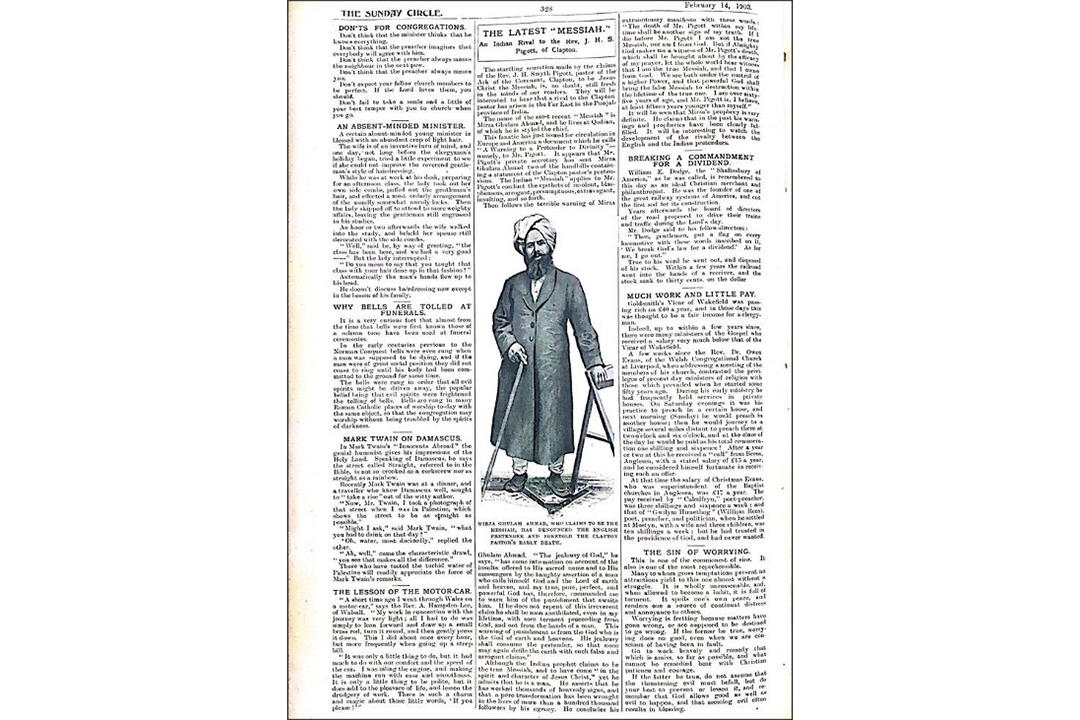
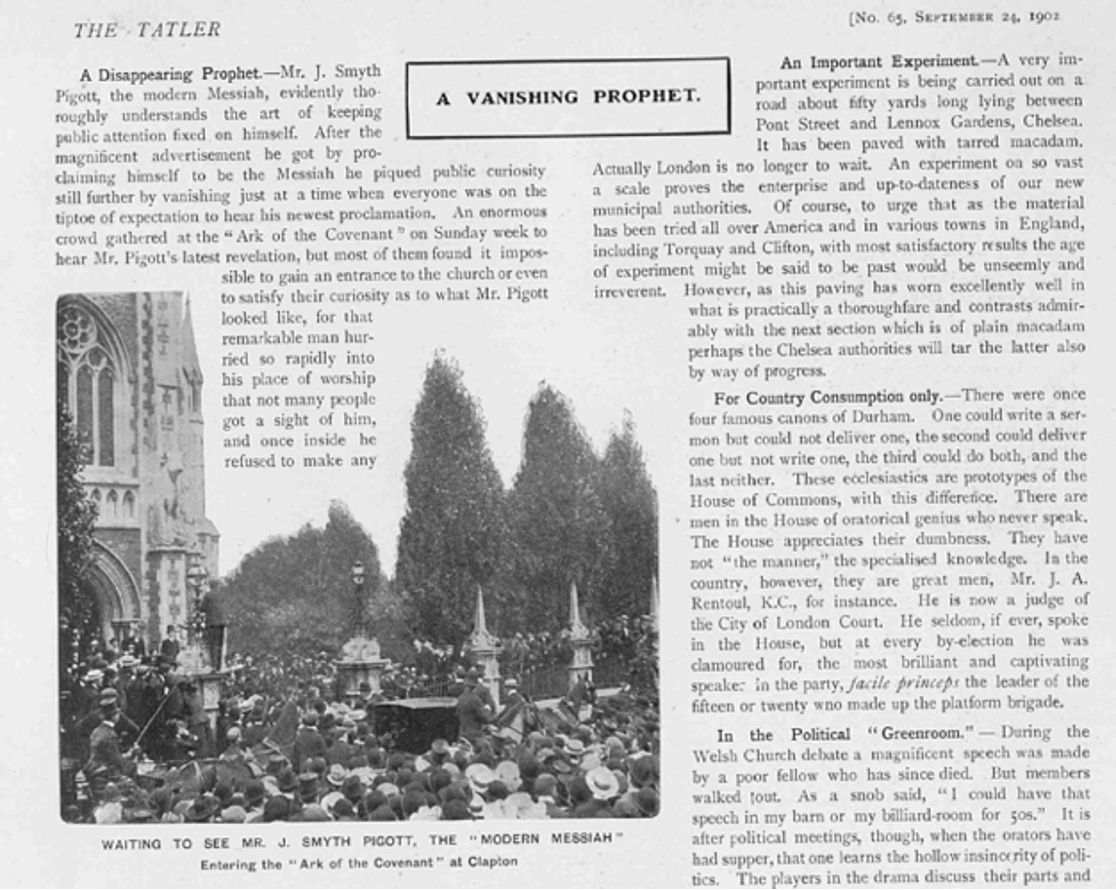
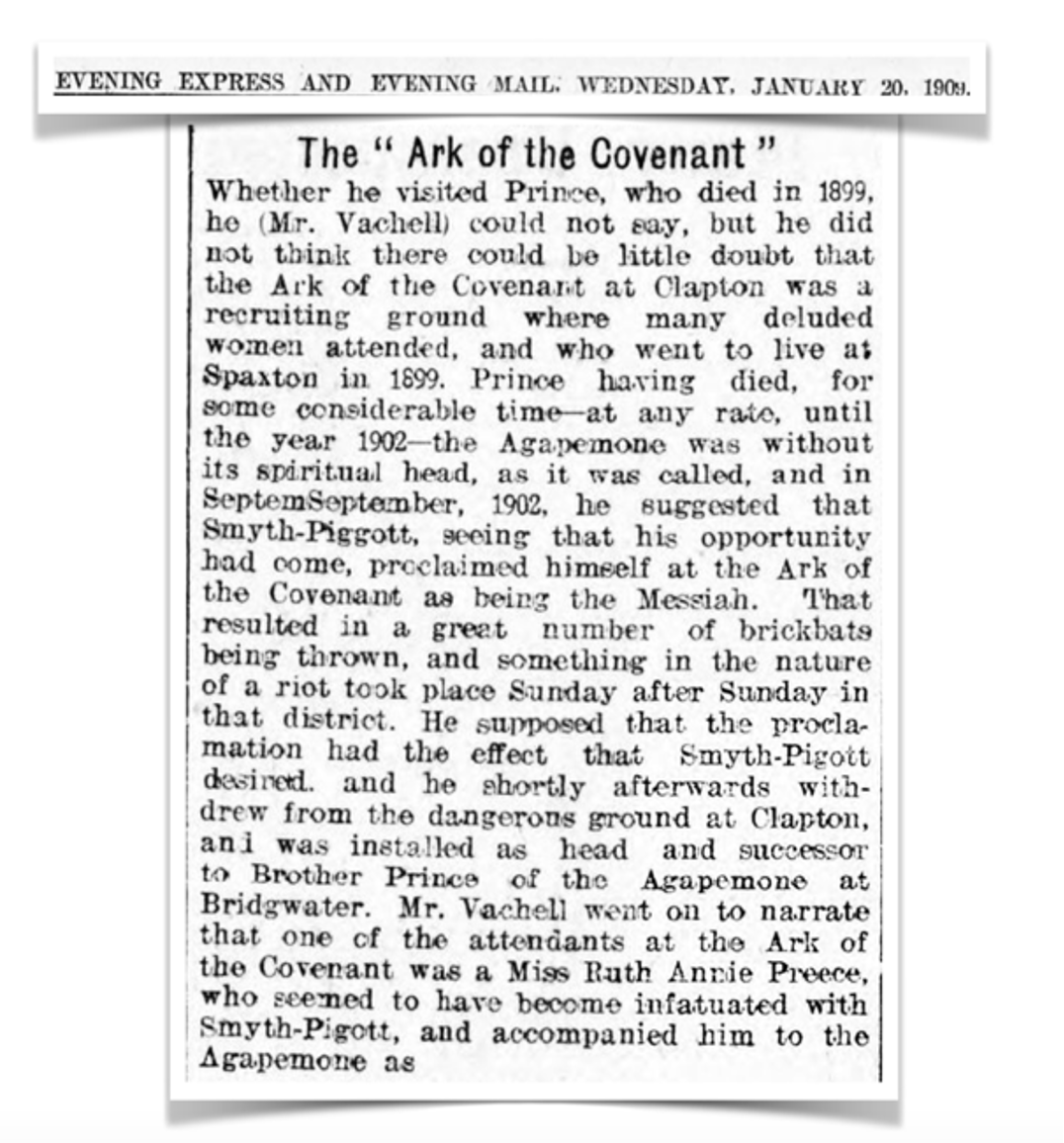
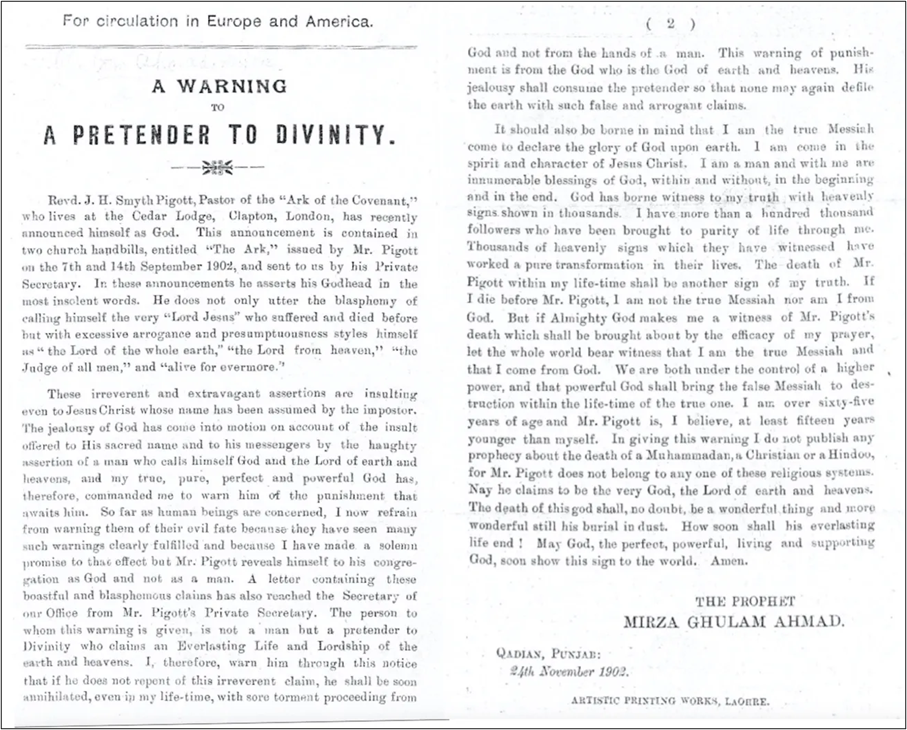
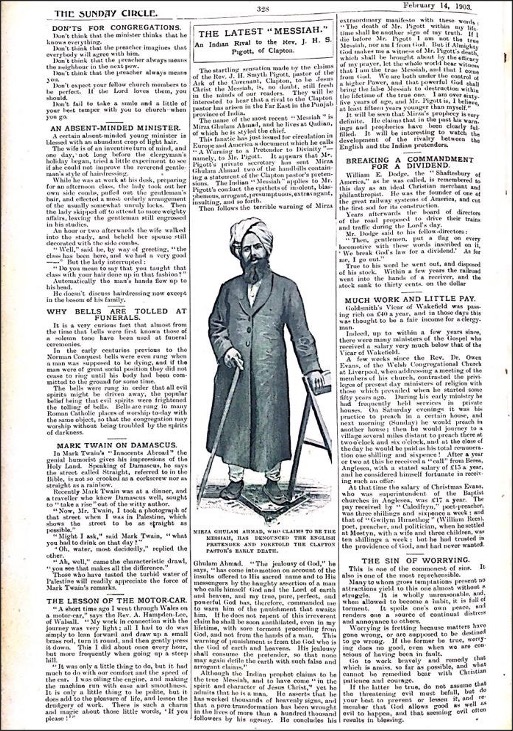
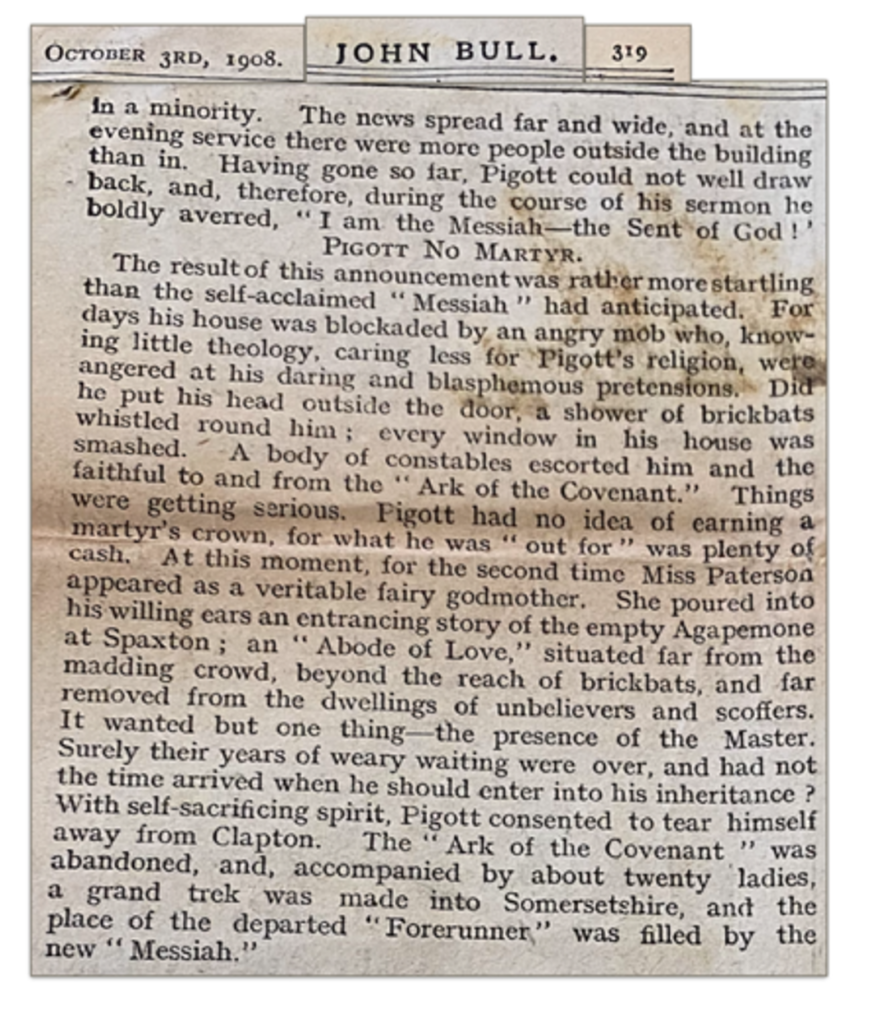
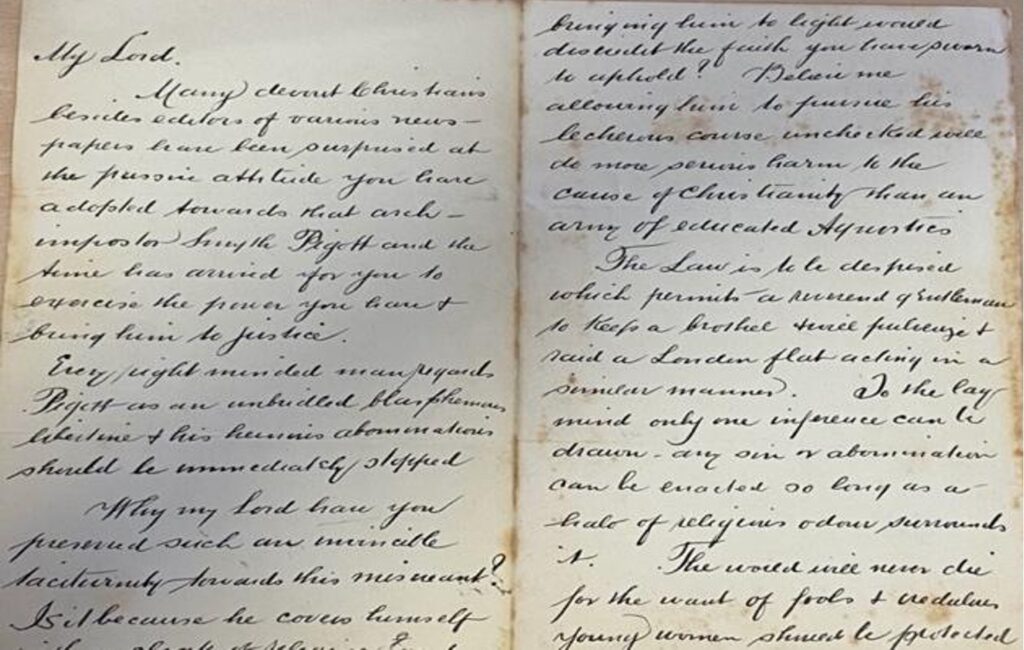
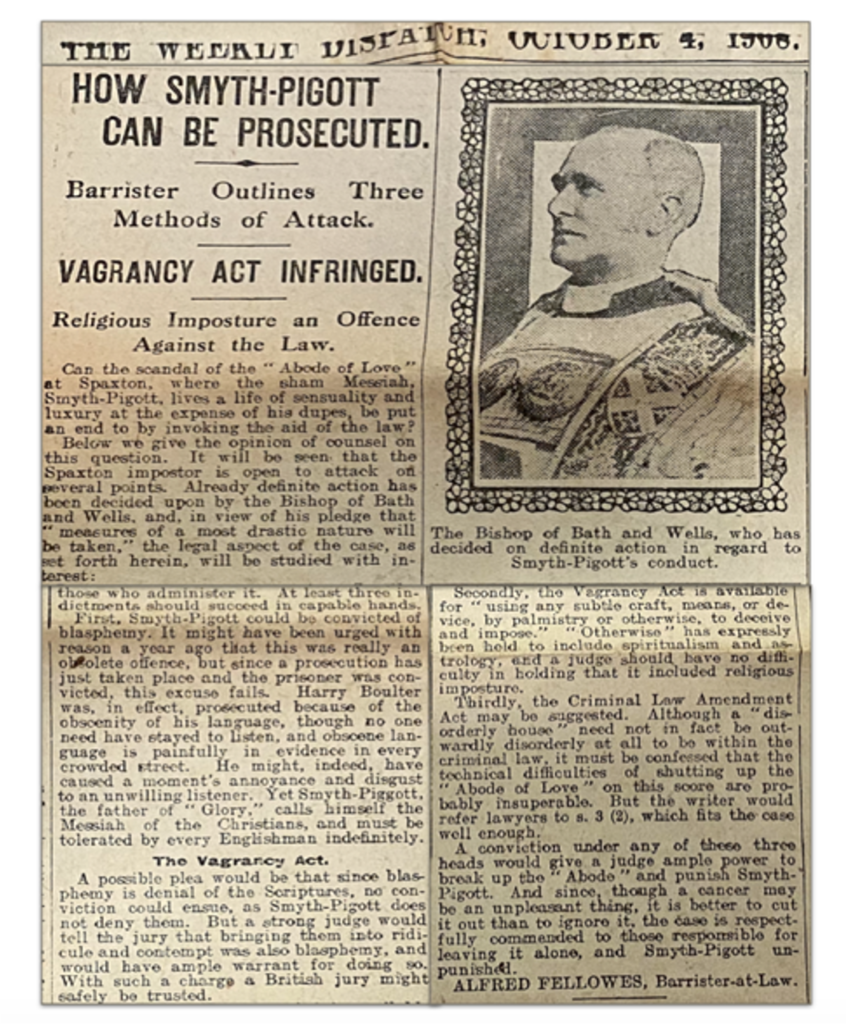
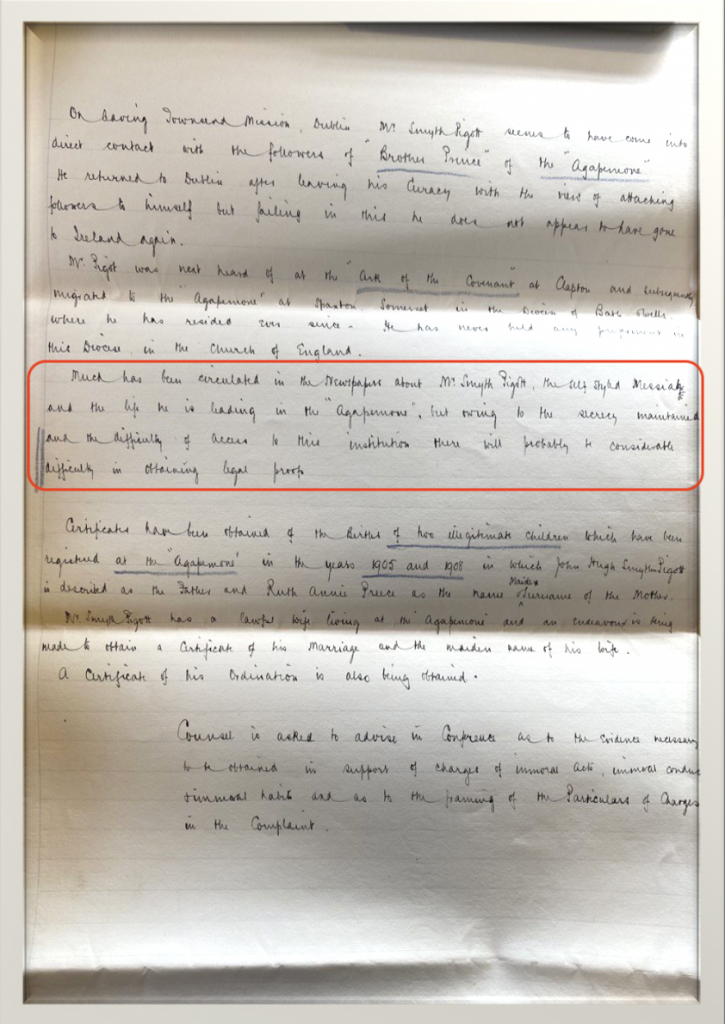
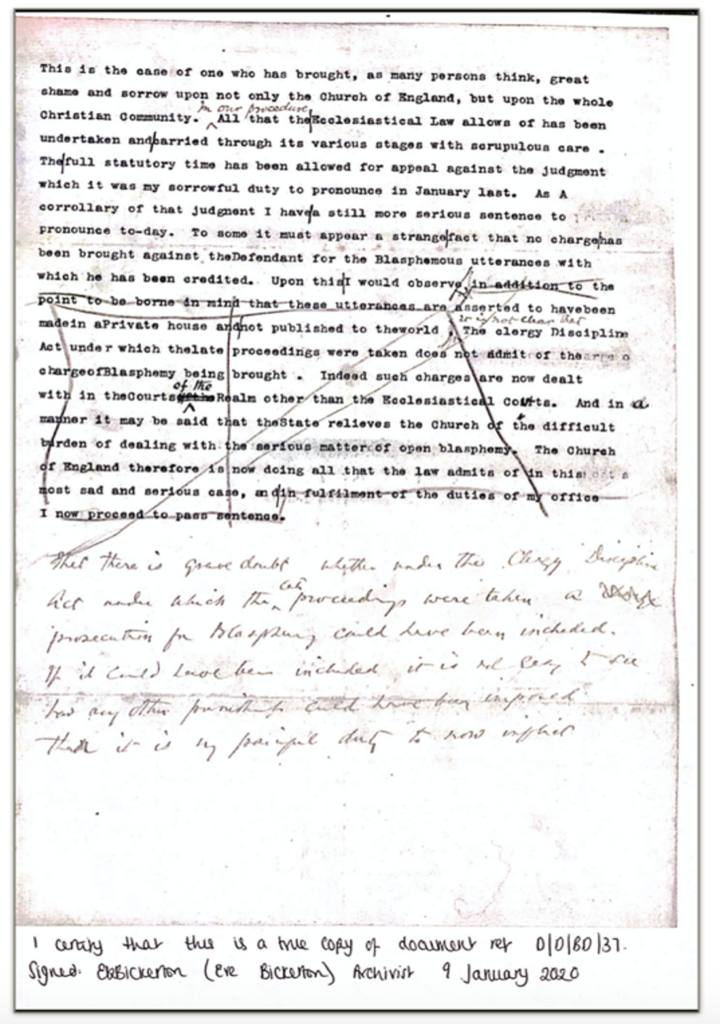
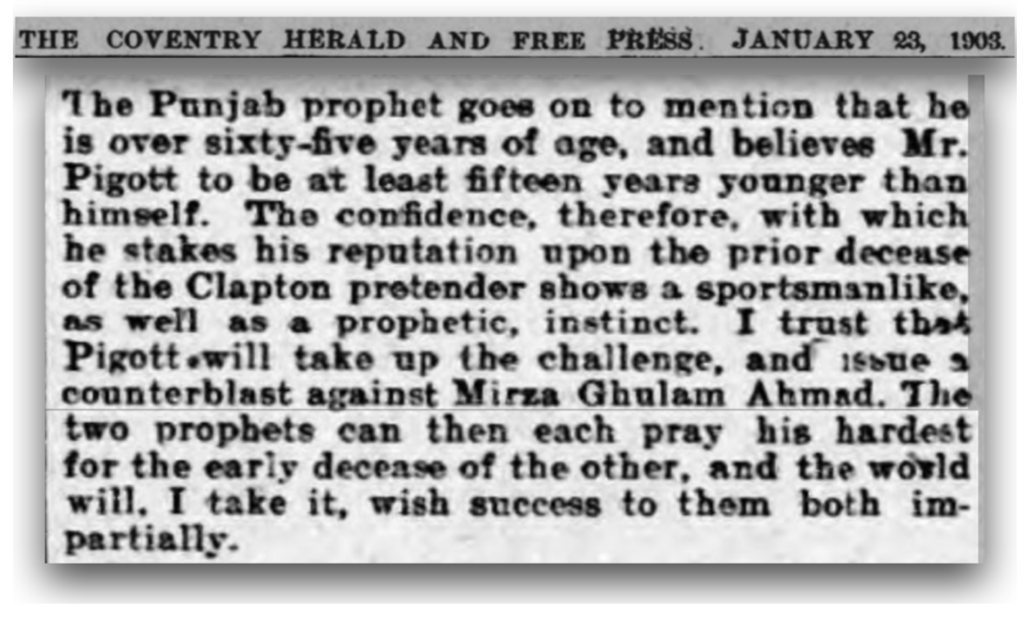
Related Articles
Hazrat Hafiz Mirza Nasir Ahmad (rh), Khalifatul Masih III – An Overview of His Life
Hazrat Mirza Nasir Ahmad, Khalifatul Masih III’s (rh) Seventh European Tour (1980)